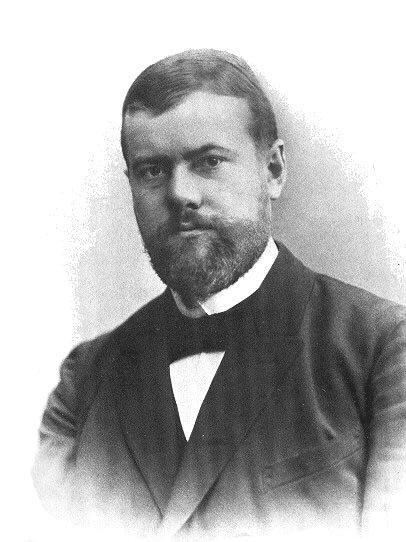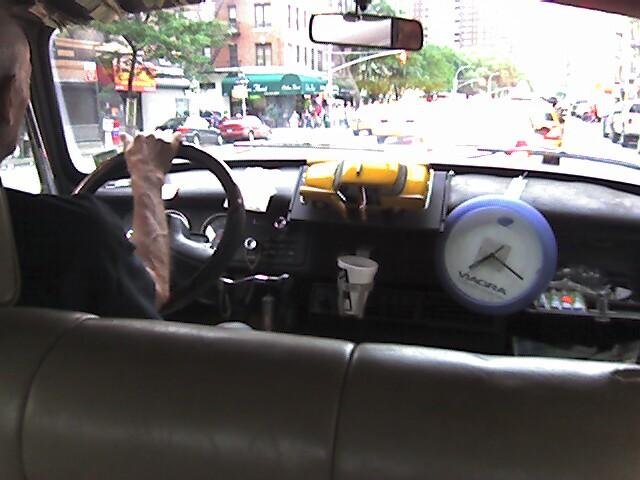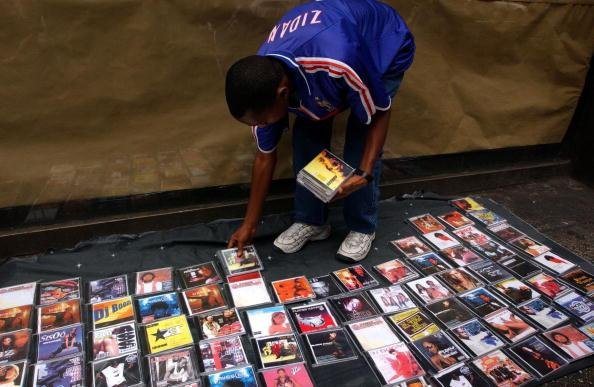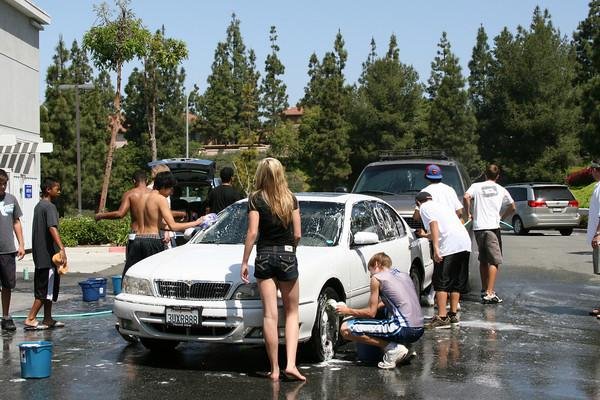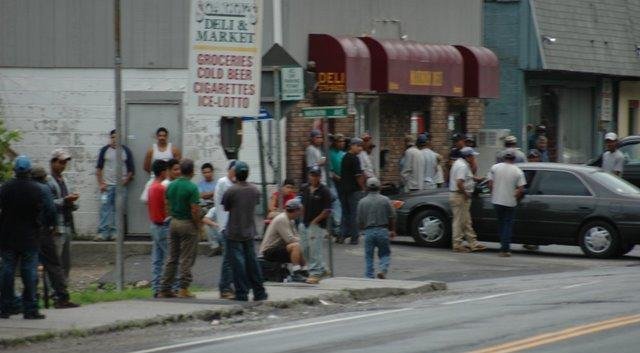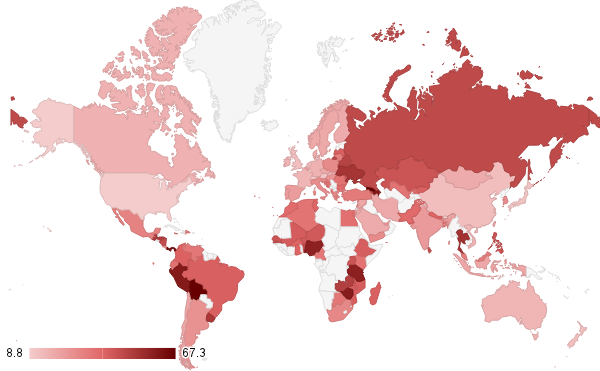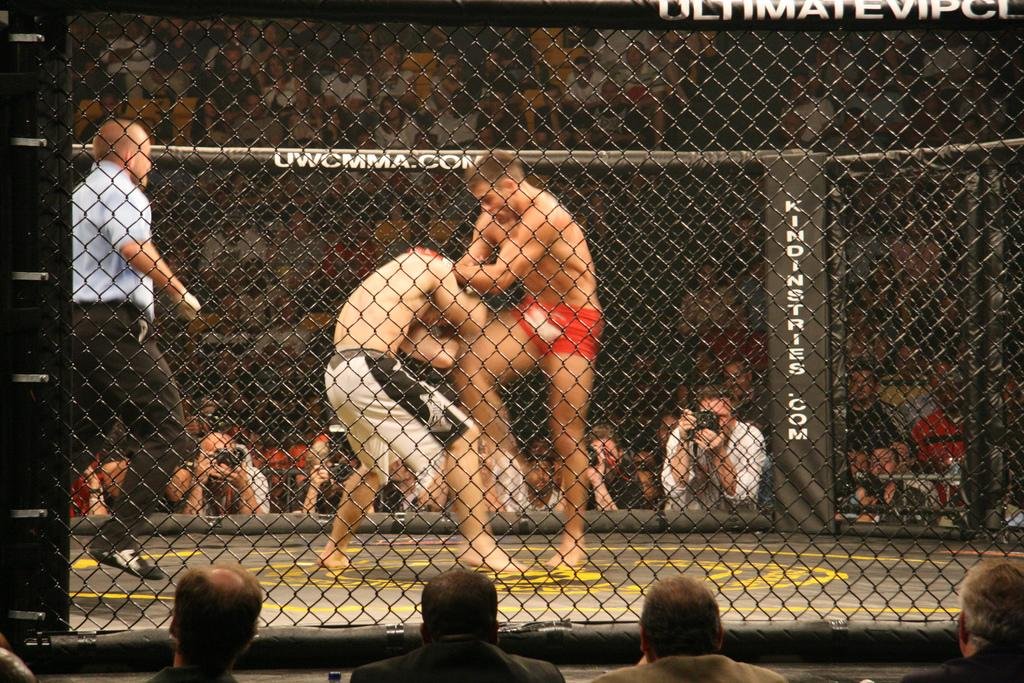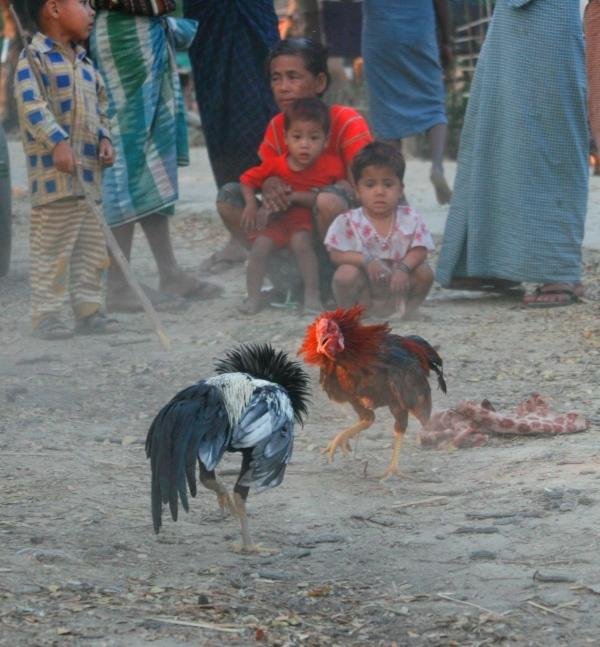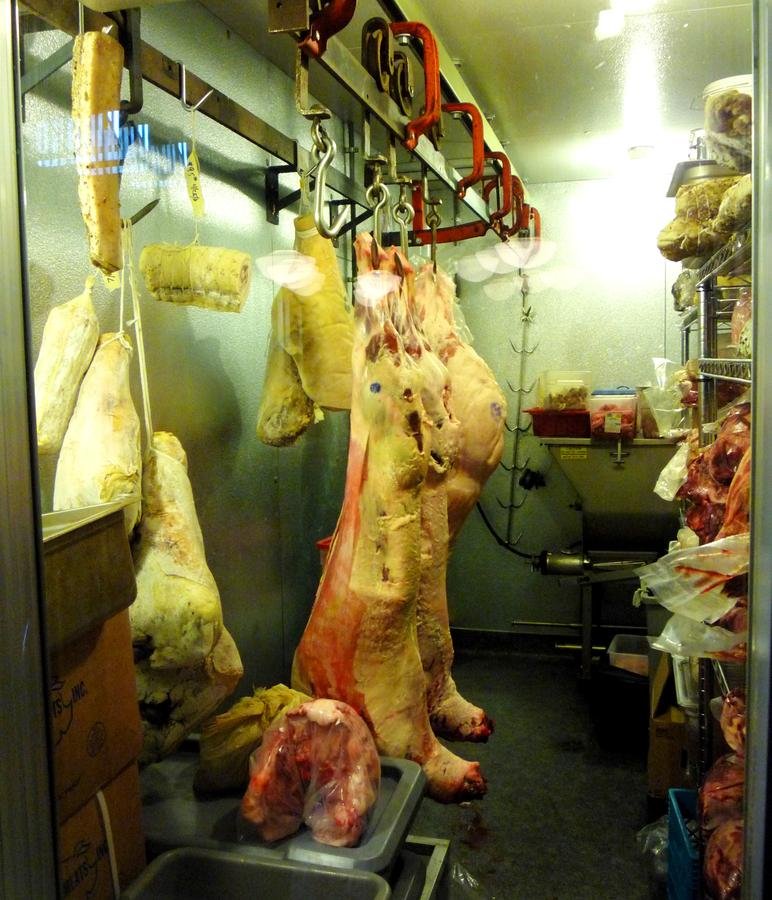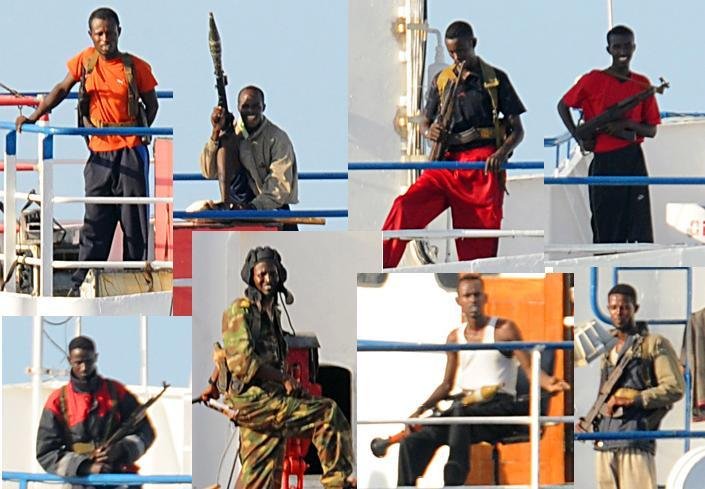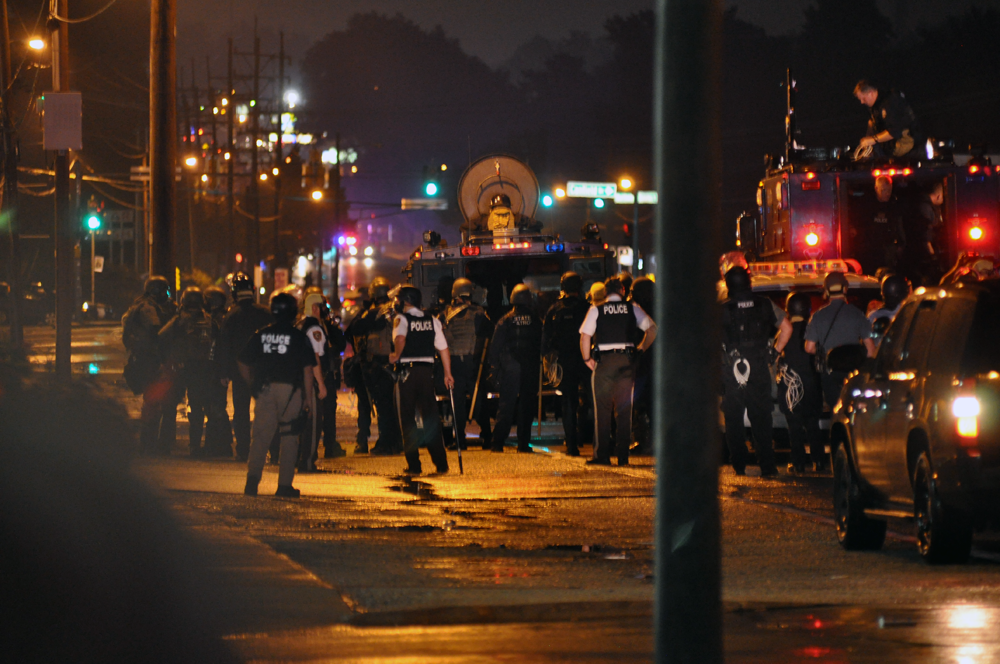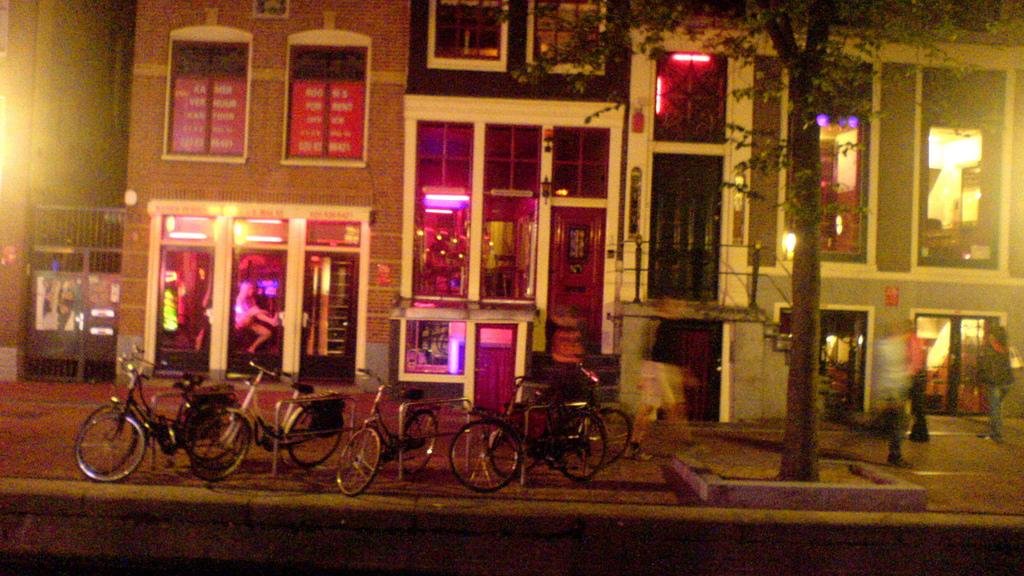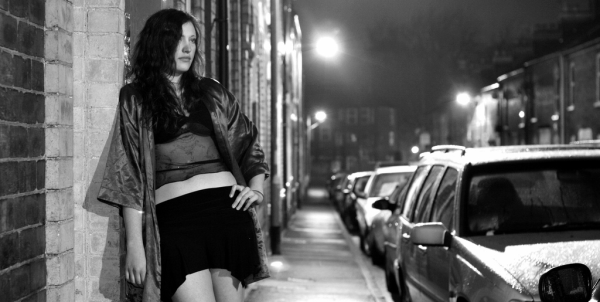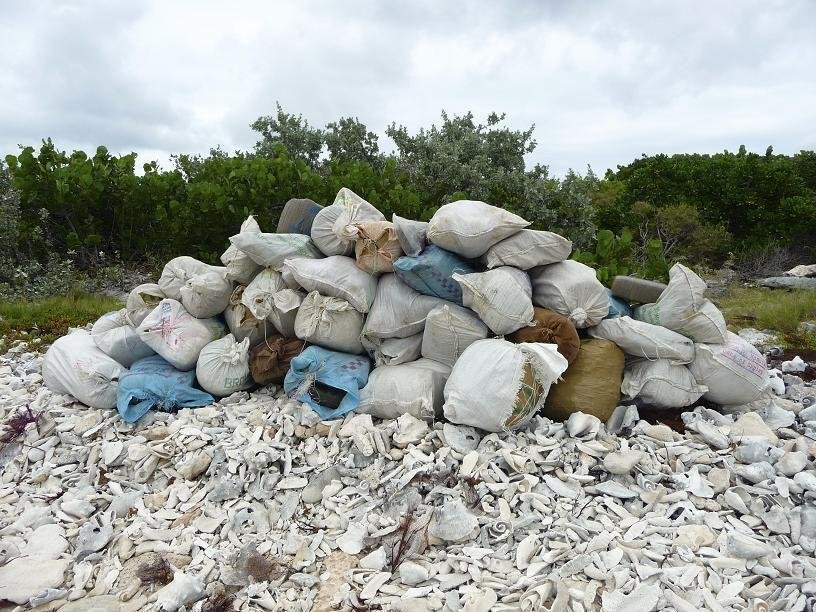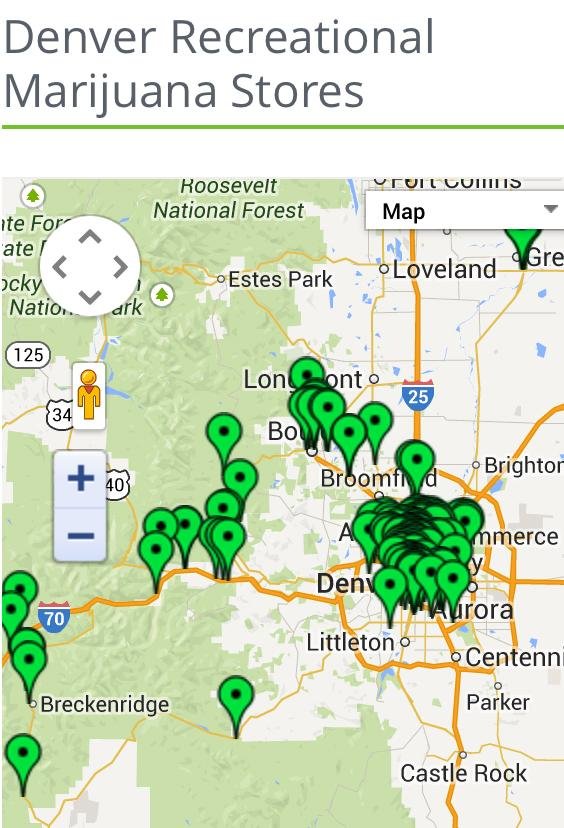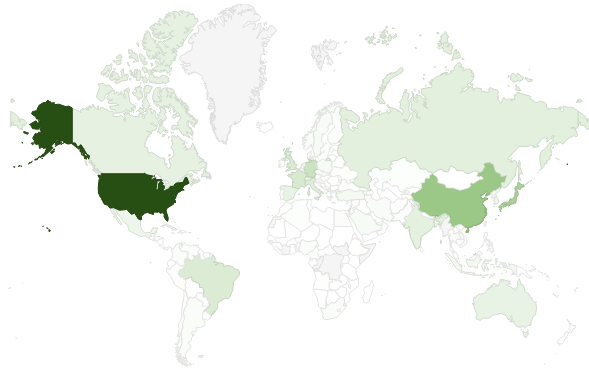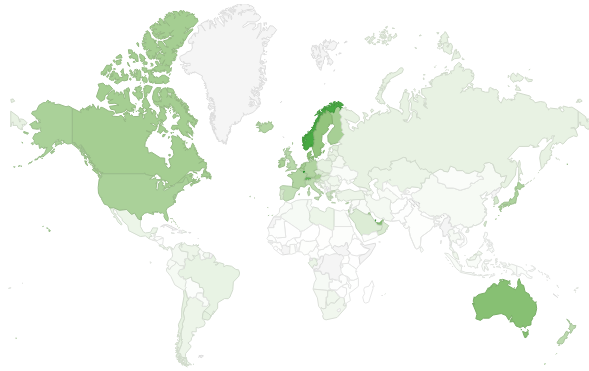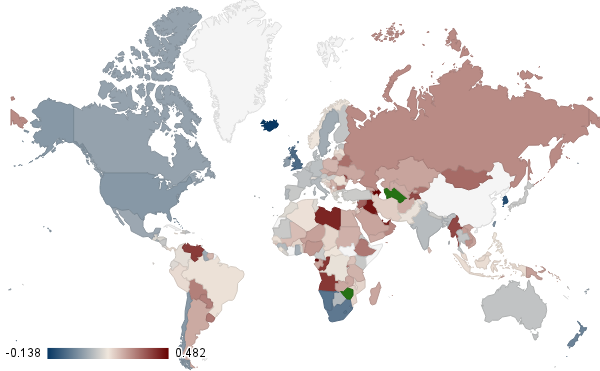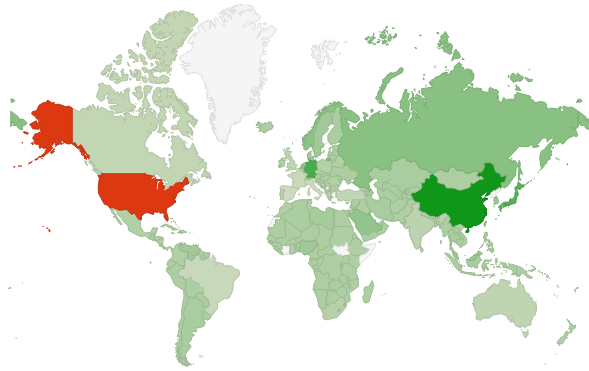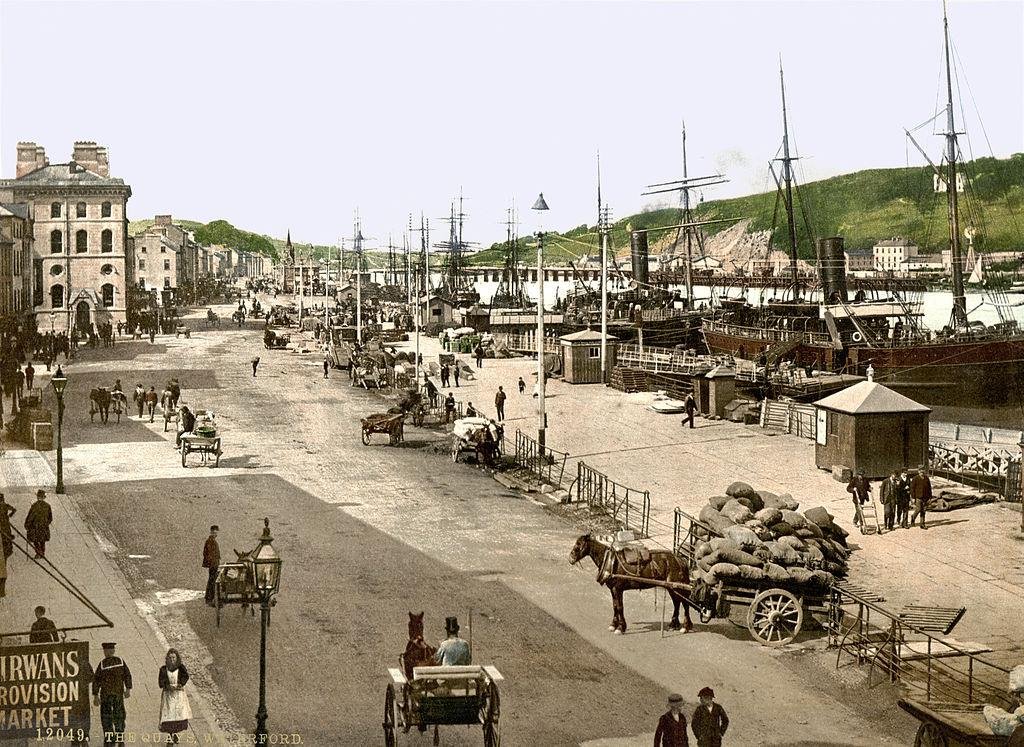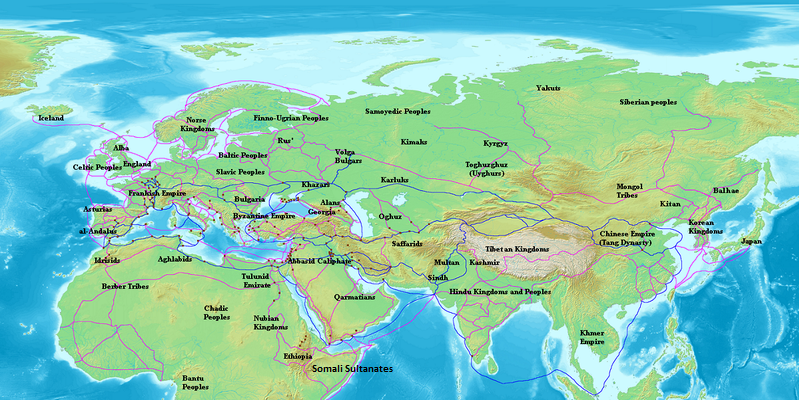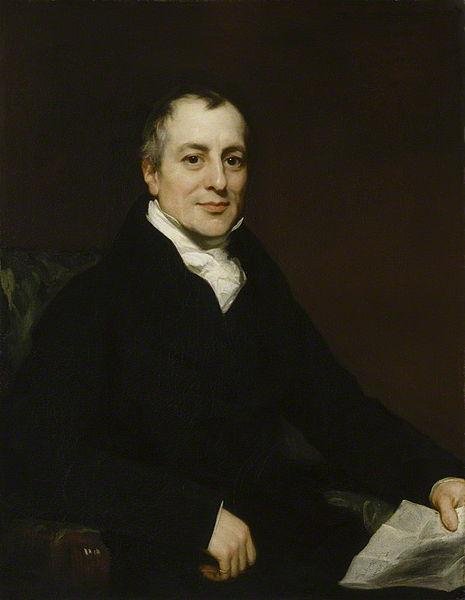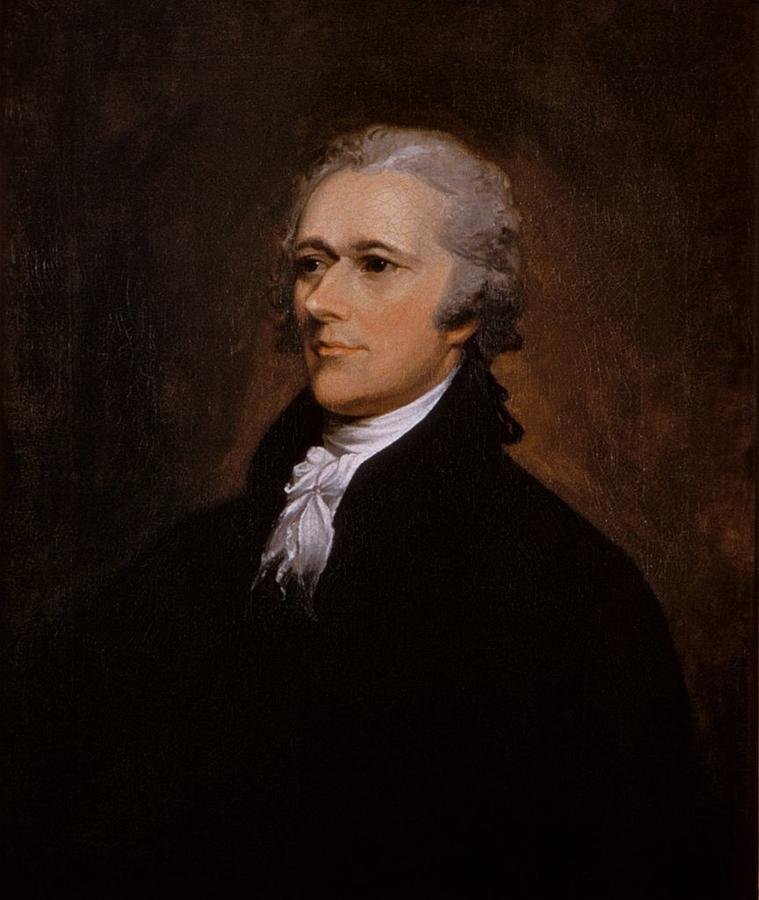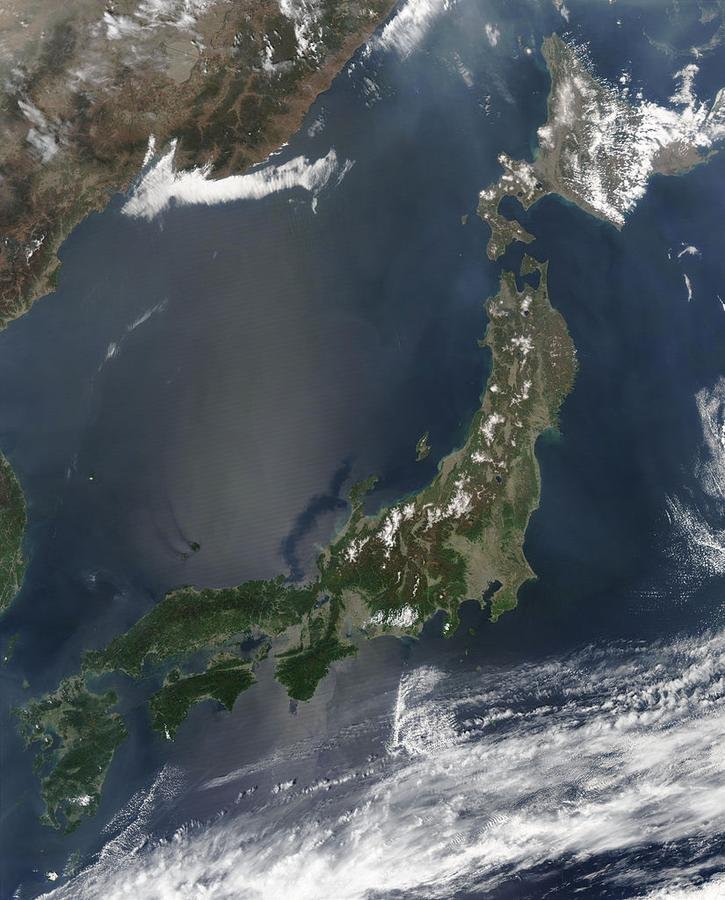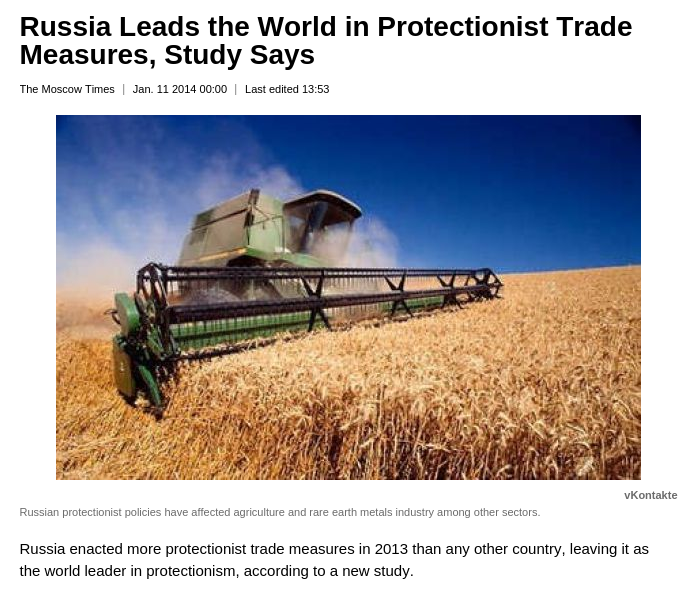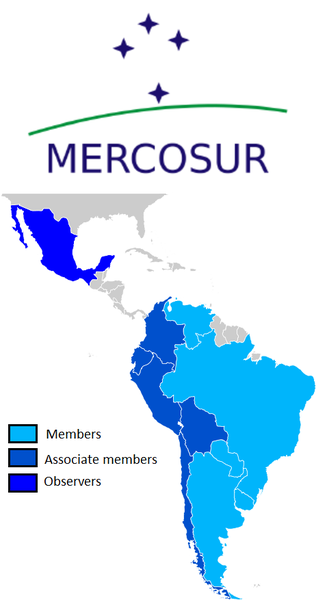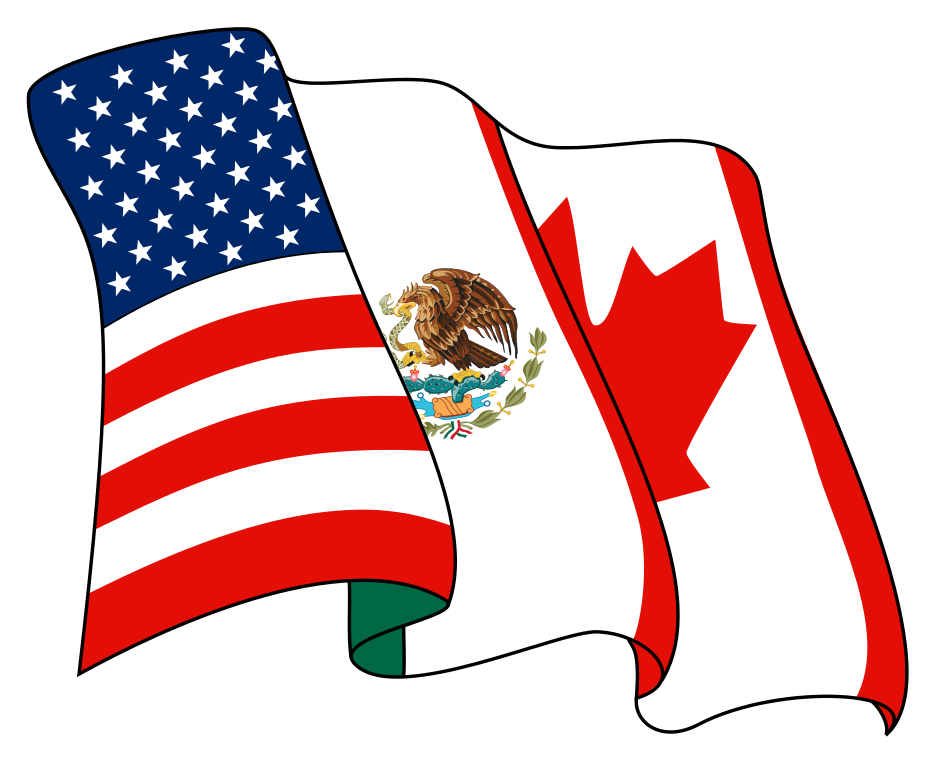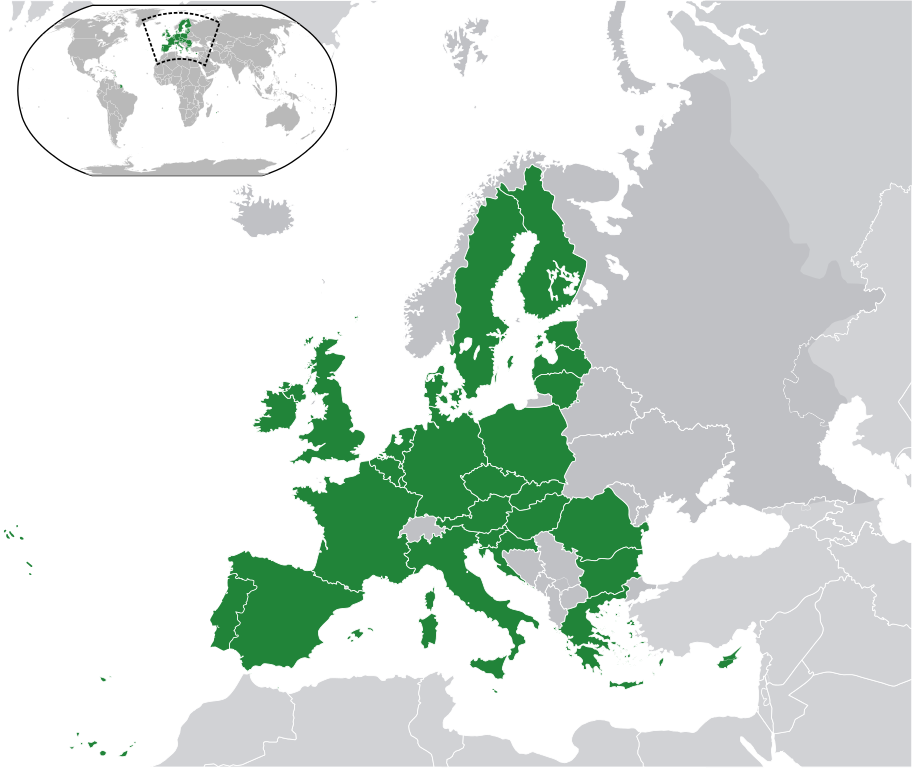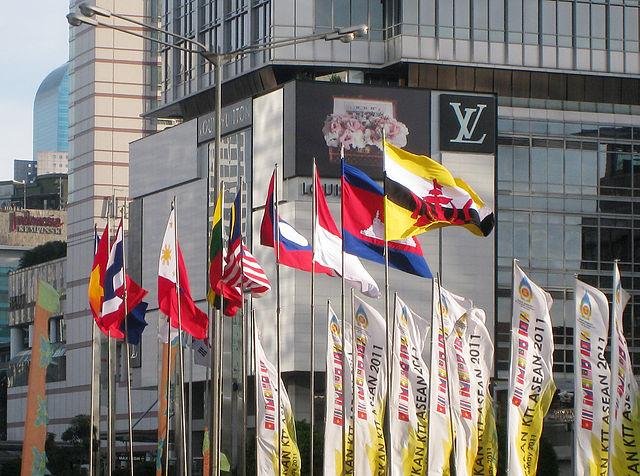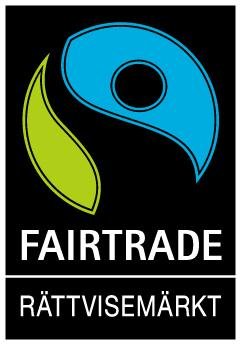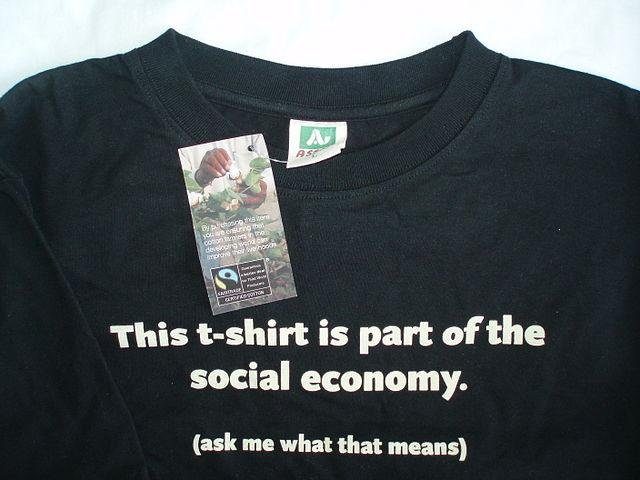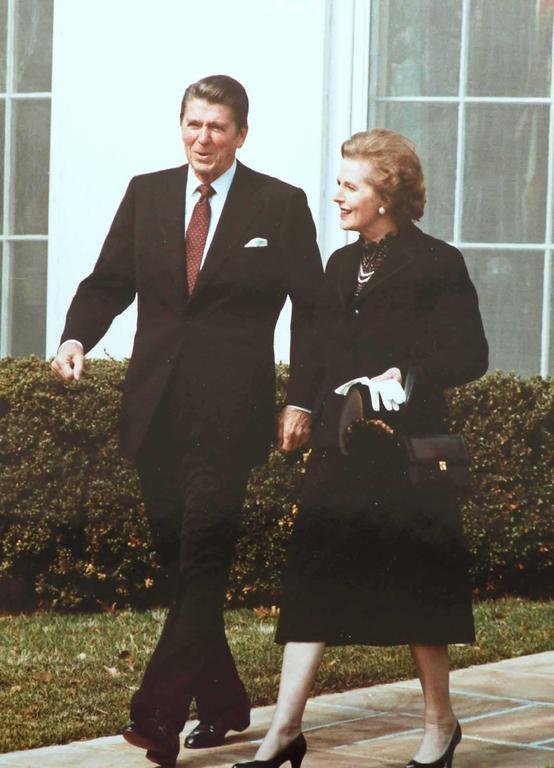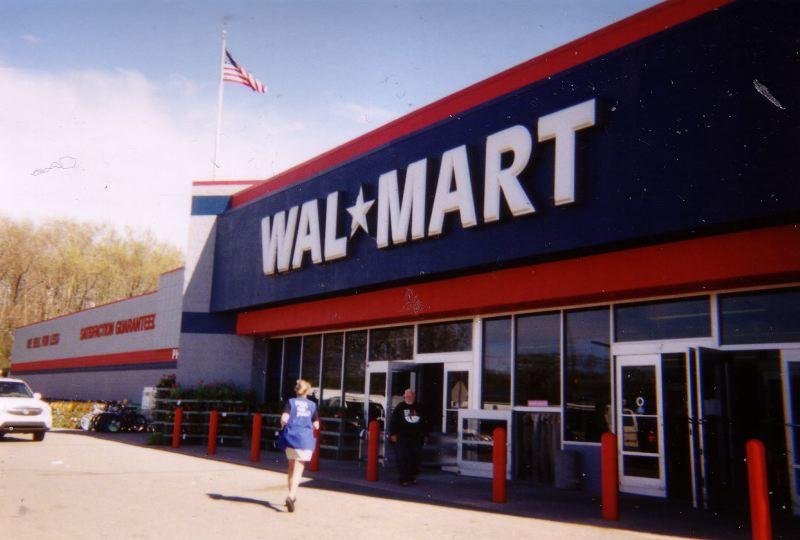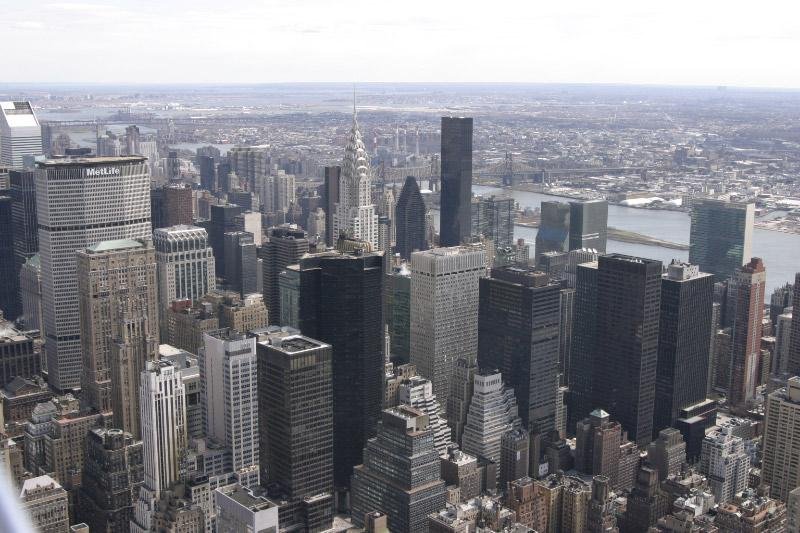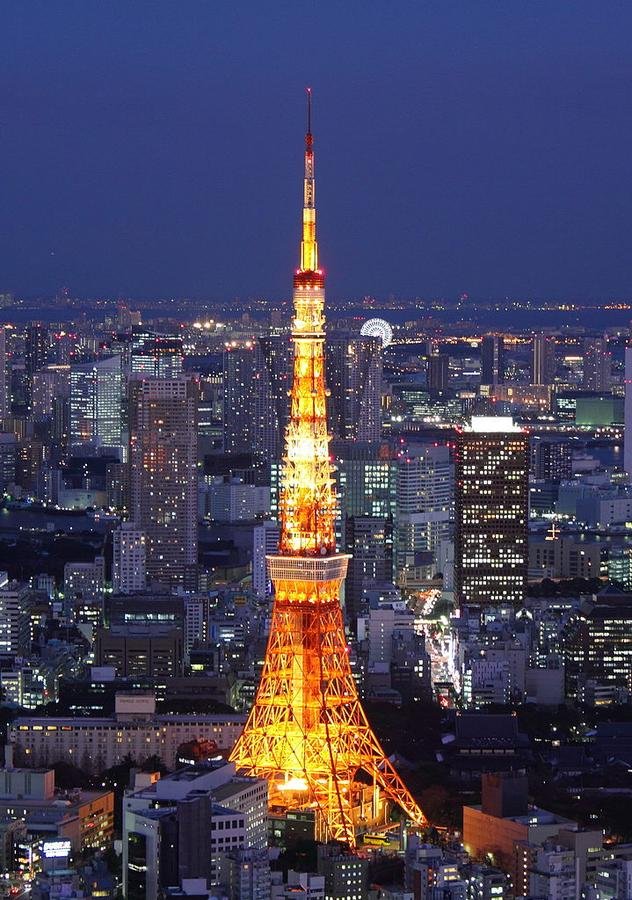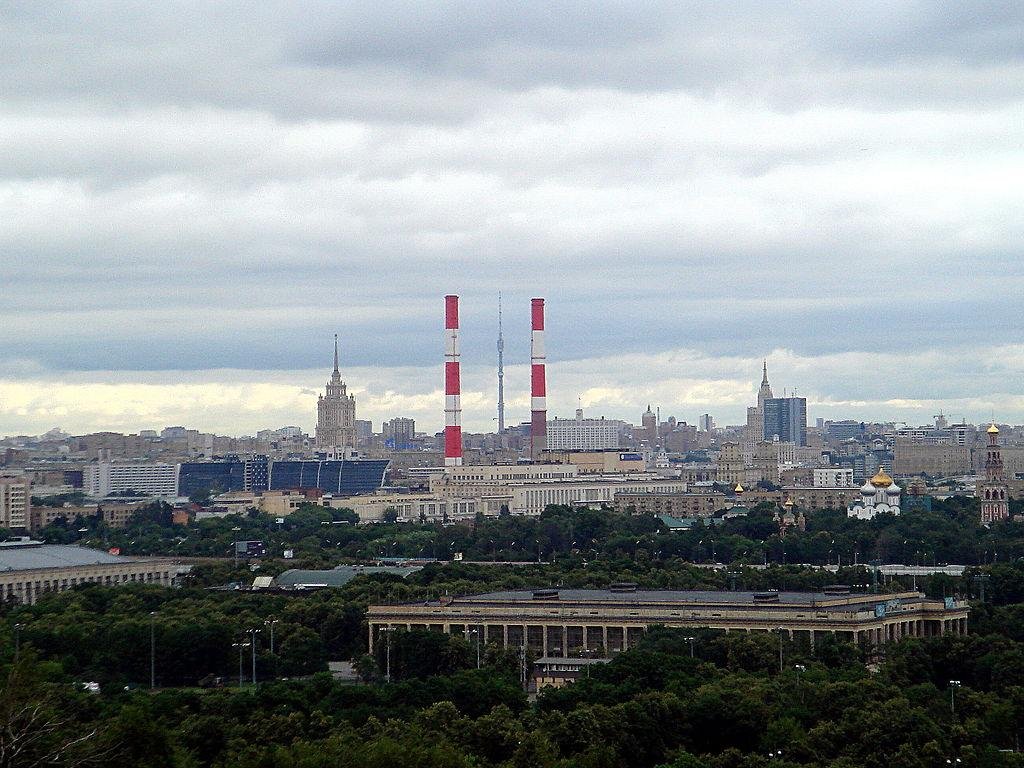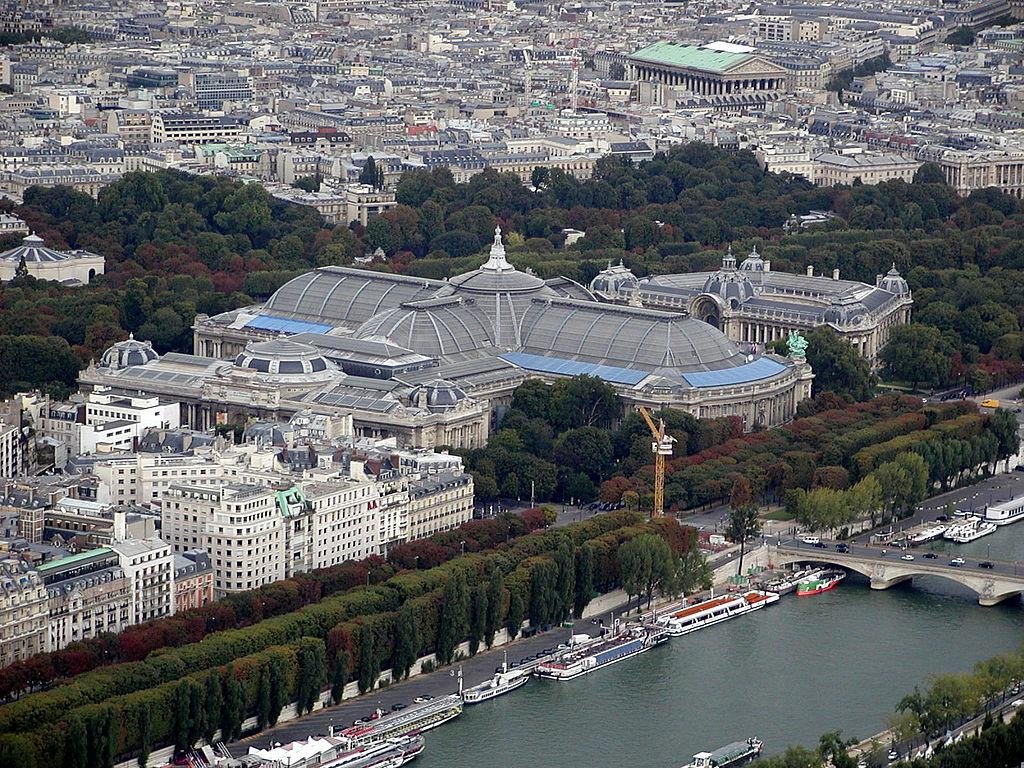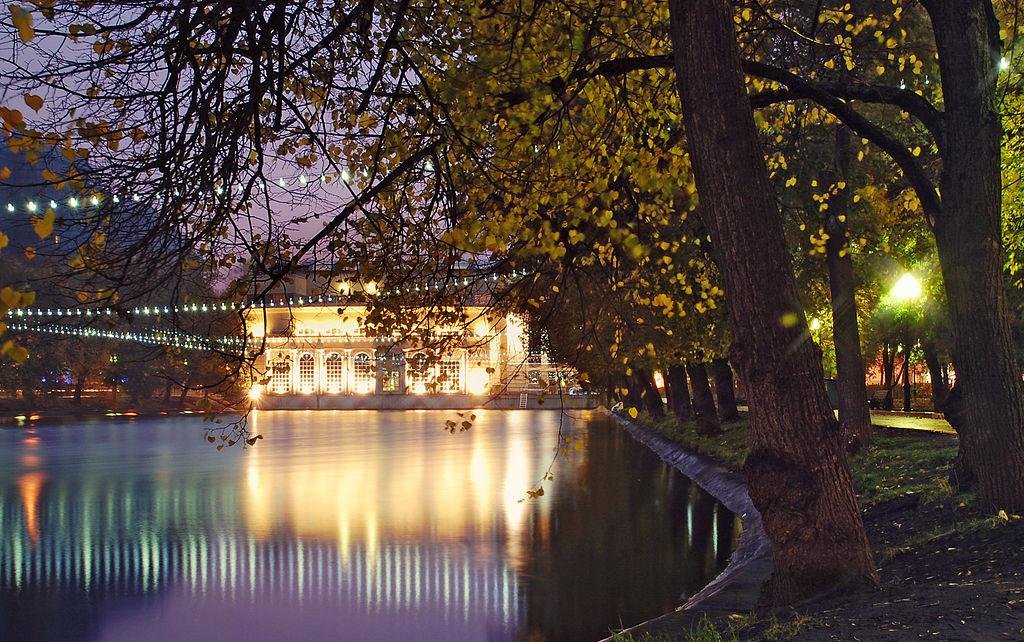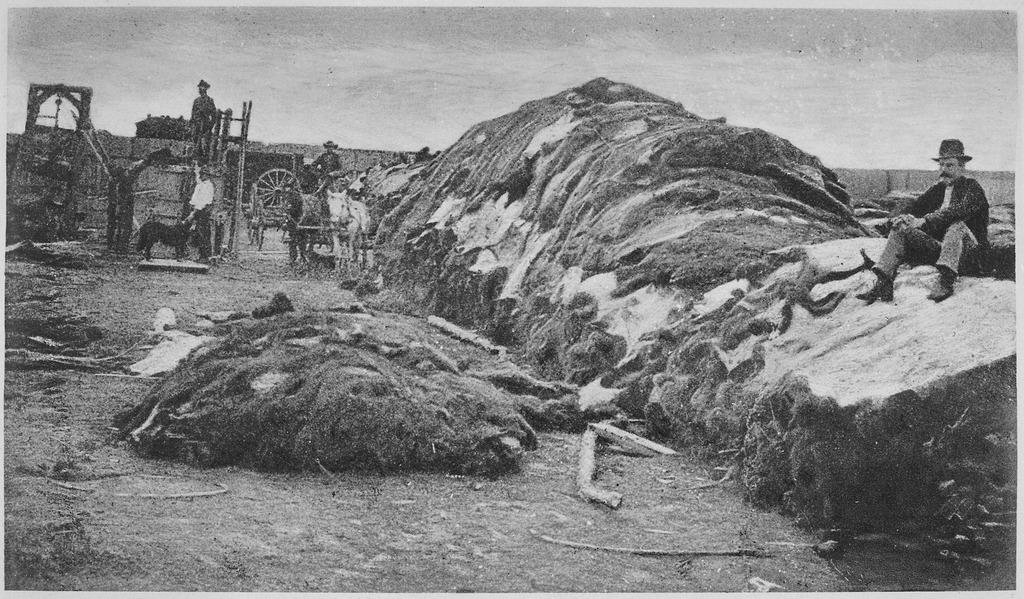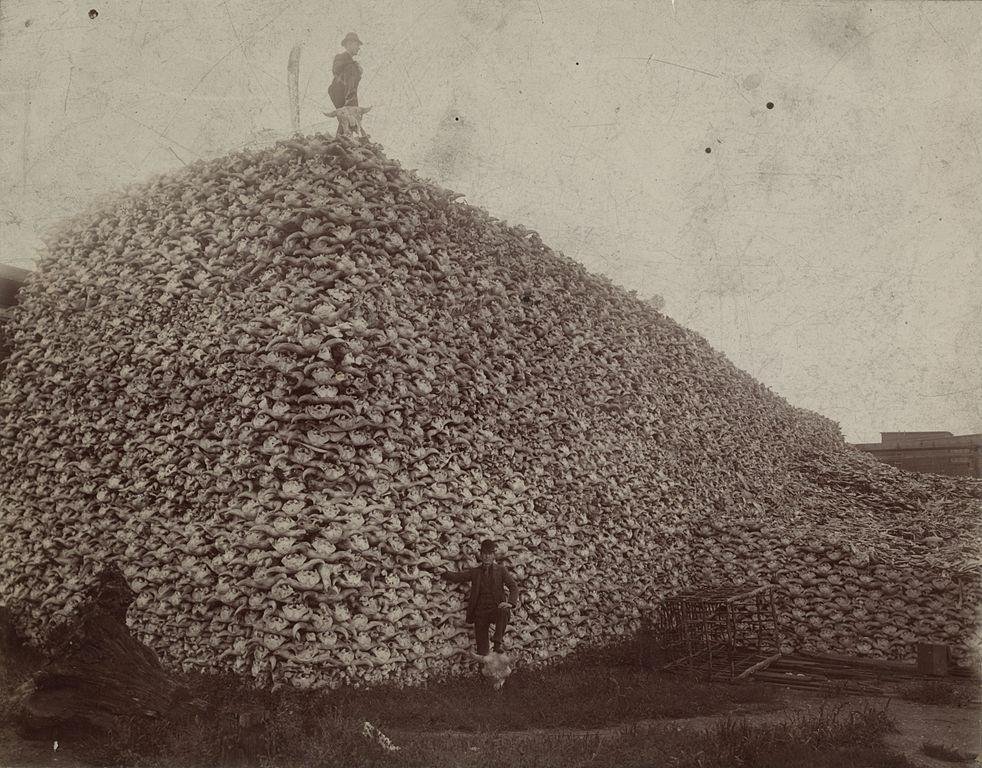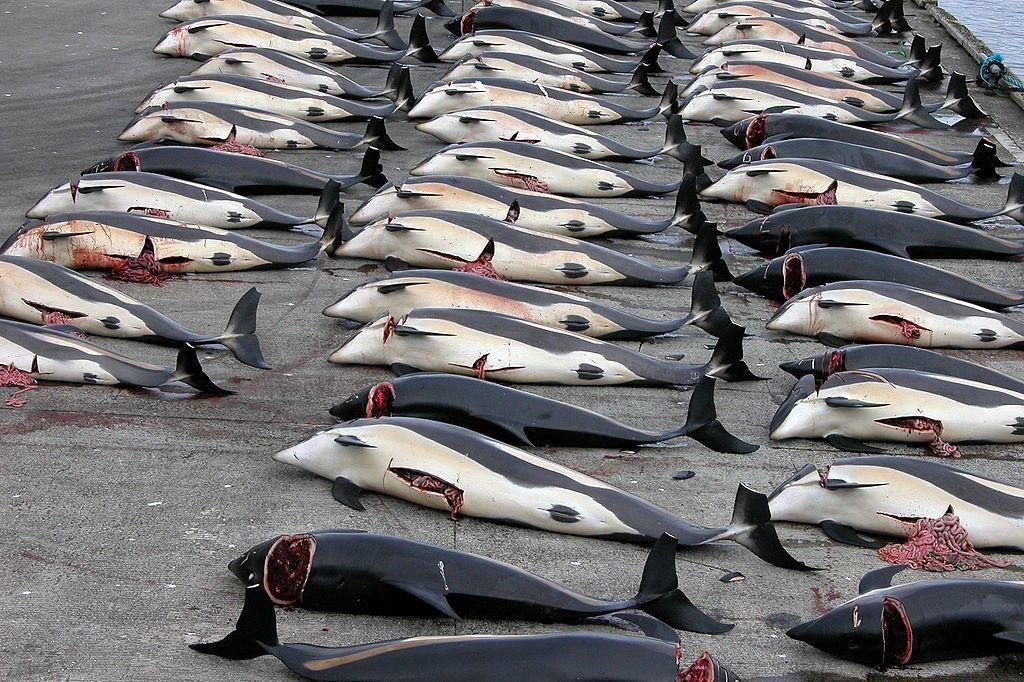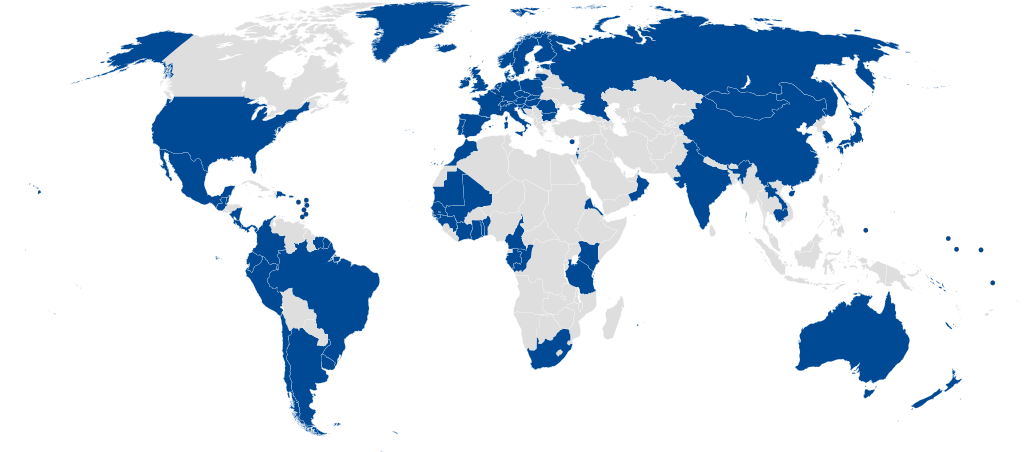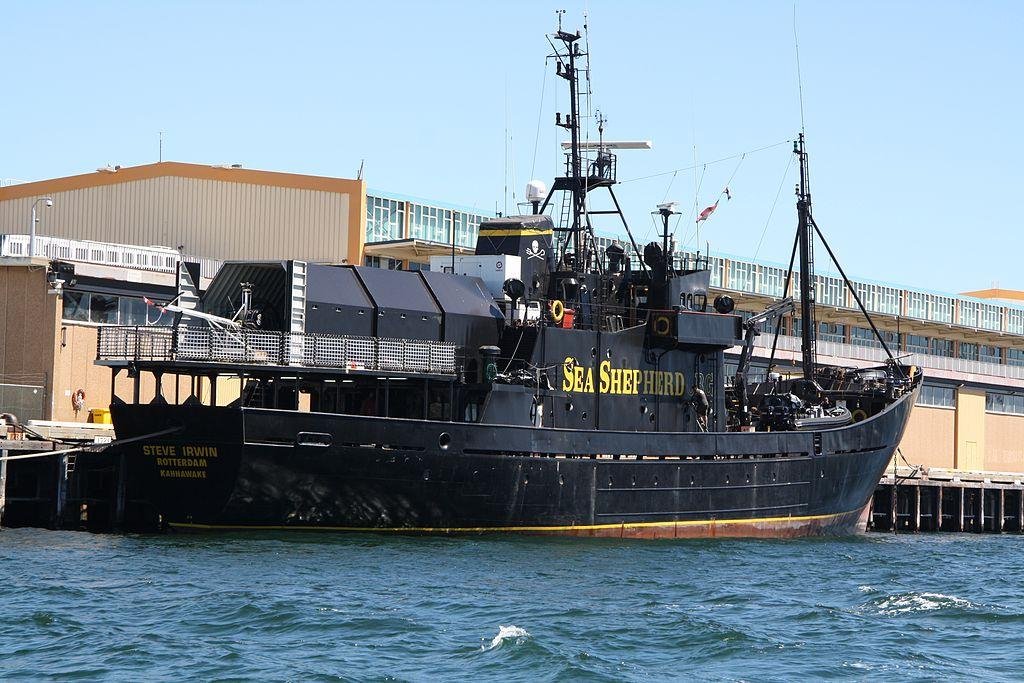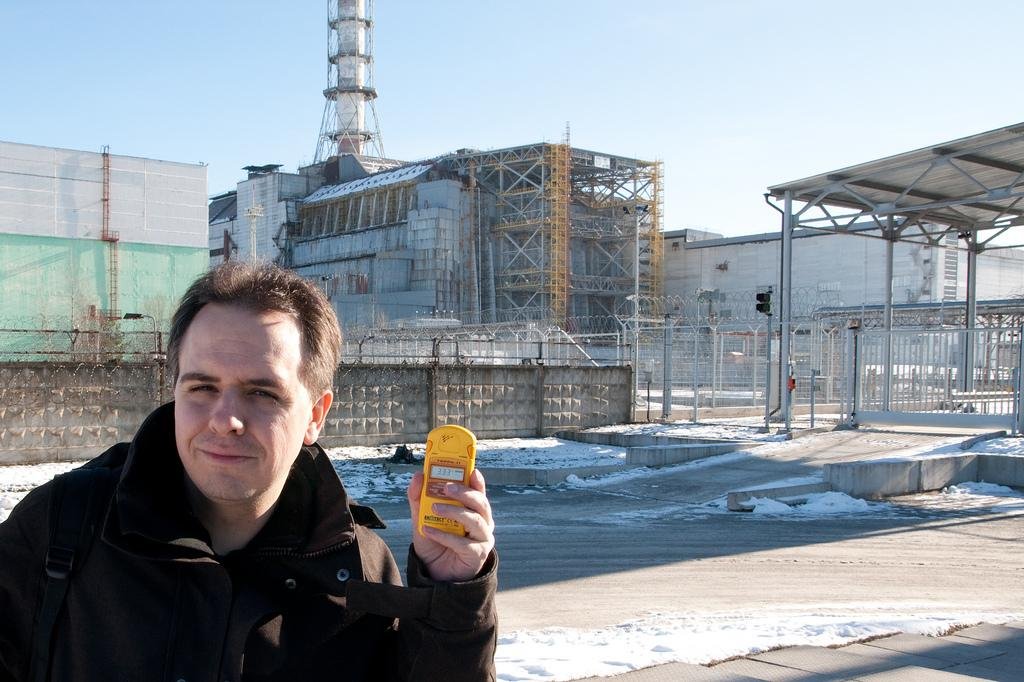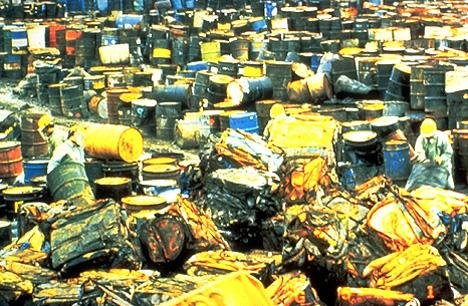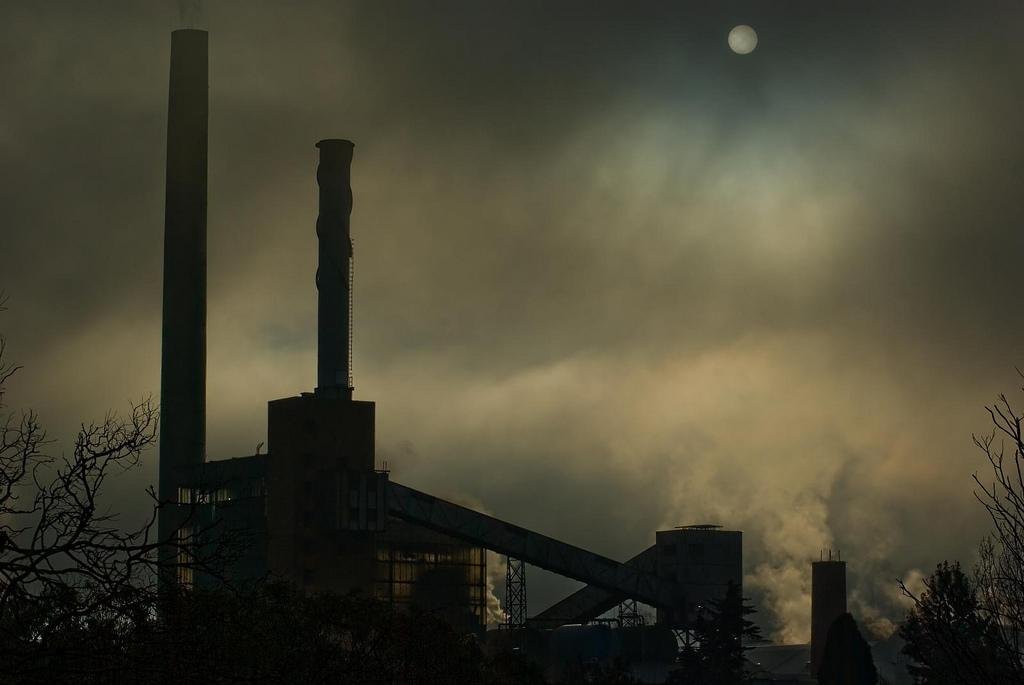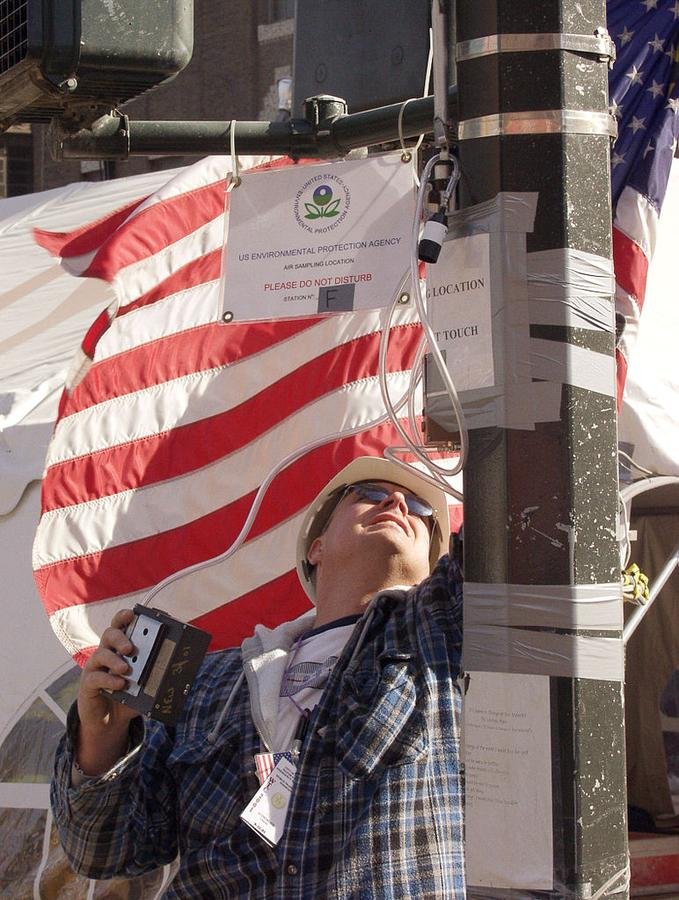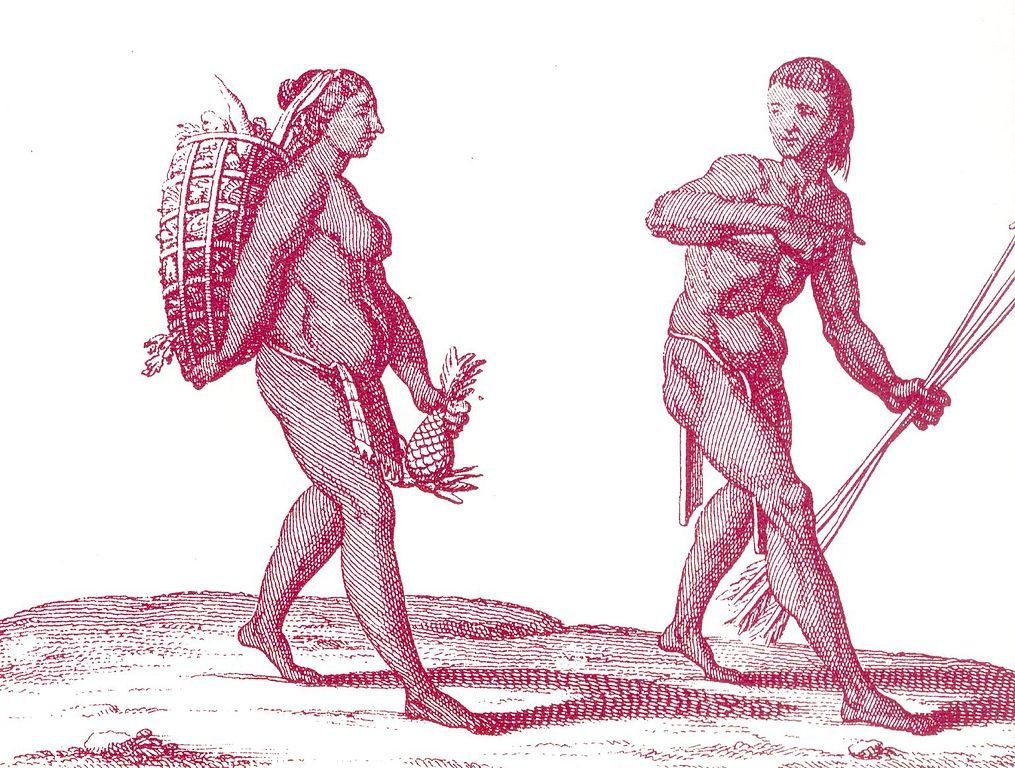Economy and the State
Module I, 2014

Benjamin Lind, Ph.D.
Department of Sociology
Faculty of Social Sciences
Higher School of Economics
Points of Interest
Motivating questions
How do states shape economies?
What are the outcomes that result from certain relationships between the economy and the state?
Addresses subjects of Interest to...
- Classical theory
- Ricardo
- Smith
- Weber
- Marx...
- Current empirical research
- Economic sociology
- Political sociology
- Organizations
- Historical and comparative research
Relevant
Political developments affect many ways we engage in economic life
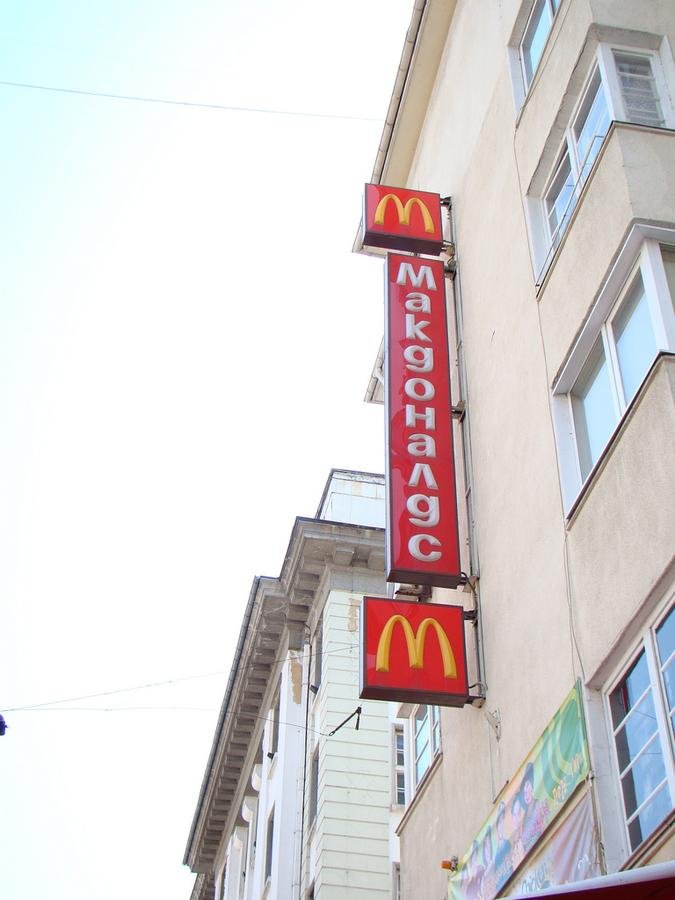
Subjects
- General concepts
- State and property
- State and money
- Labor and welfare states
- Firms
Development- Global economy
- Environment
Follows textbook
Grading
Classroom
Paper
Exam
questions?
Introductions

Picture courtesy of Álvaro Canivell
Instructor
- Education
- Research
- Social movements, labor
- Social networks, quantitative methods
- Historical case studies
- Teaching
- Contact
- Ben blind@hse.ru
- Anita anitamoiseeva.a@gmail.com
- Office 314, 13 Milyutinskiy per. (appointments only)
*
E-mail formalities
- "Ben" or "Benjamin"
- Informal and familiar
- Accurate and preferred
- "Prof. Lind" or "Dr. Lind"
- Formal and professionally familiar
- Accurate and appropriate in U.S. culture
- Inaccurate in Russian culture
- "Mr. Lind"
- Formal and unfamiliar
*
...or what to call an international professor with a Ph.D., but no patronymic
Course
- Paradox
- Goal
- Provide a thorough understanding on the relationships between the economy and the state
- Instruction style
- American, conversational and informal
- Emphasis on interaction
- De-emphasis of physical documents
- Seminar starts in two weeks
- Language and a vow
Students
- Tell me
- Your name
- Interests in economic sociology
- Last item bought
- Career ambitions after graduation
- Record keeping
- Complete form on following slide
- Required for participation grade
Syllabus Overview
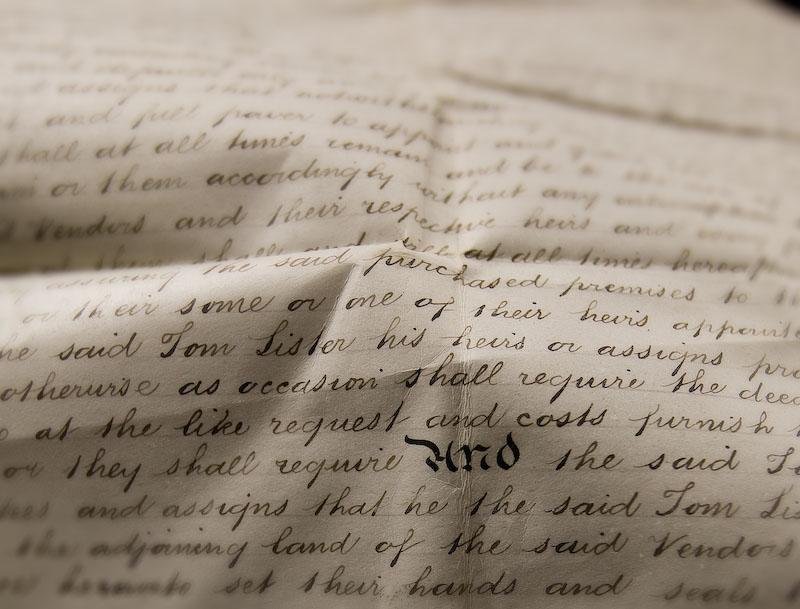
Picture courtesy of Dave Wilson Cumbria
Readings
Electronic copies of the readings will be made available for you.
Seminar
- Two articles or sets of articles
- Each article or set of articles has two parts, led by different students
- Review (10 - 15 minutes)
- Discussion (25 minutes)
- Relate (~5 minutes)
- Evaluate (~5 minutes)
- Discuss (10 - 15 minutes)
Theory and General Concepts
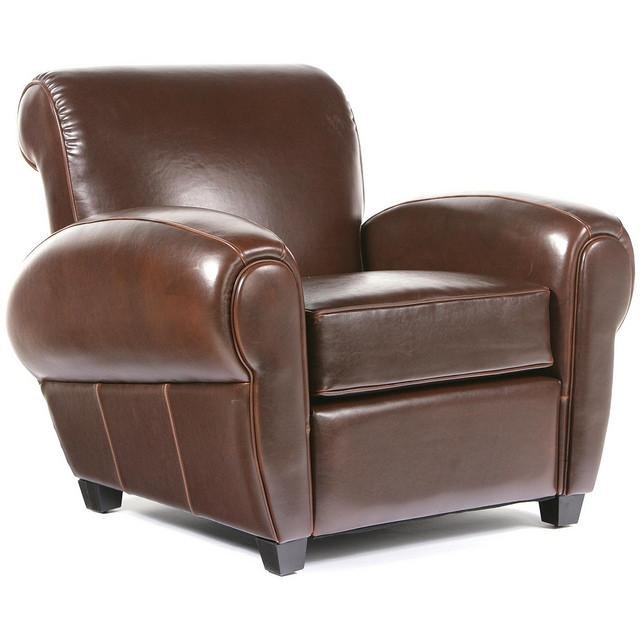
Picture courtesy of brunurb
Orientation
- There has always been a relationship between states and economies.
- Bad question
- E.g., "Should the government be involved in economic affairs?"
- Good questions:
- E.g., "What factors account for variations in social spending?"
- Or, "Which supranational development practices increase or decrease socioeconomic inequality?"
- There is no singular relationship between states and economies.
What is the economy?
The complex of activities involving the production, distribution, exchange, and consumption of goods and services, including paid activities in the formal sector and unpaid, informal, and illegal economic activities.
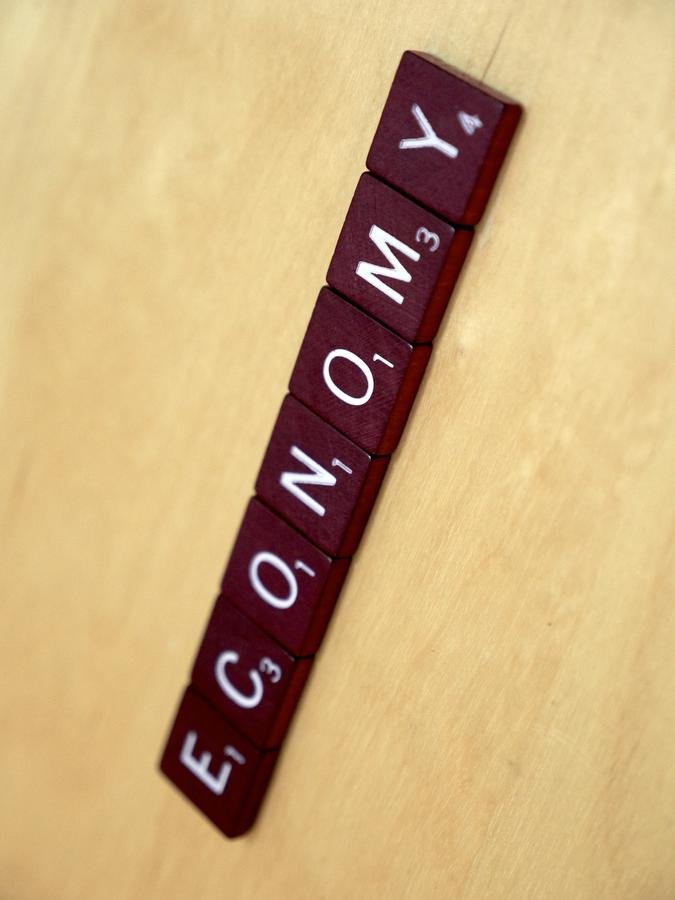
-Bandelj and Sowers (2010:205)
Image courtesy of Lending Memo via Simon Cunningham
What is the Economy?
- It includes
- Labor
- Paid and unpaid
- Consumption & Expenditures
- Investment & Sales
- Services
- Informal Economy
- Illegal Economy

What is the Informal Economy
Economic activities that happen outside the purview of the state
-Bandelj and Sowers (2010:207)
The informal economy often connected to and supports the formal economy.
It includes...
-"Charge?"
-"Whatever your want, a million dollars or one."
Photo courtesy of Daniel Latorre
Title Text
me and my summer job as a kid....
yep scanned right out of the family album thats me getting ready to mow some lawns when i was a kid...
Photo courtesy of jefzila
Car Wash Fundraiser May 16th
RB Football and Tour de Force dance team fundraiser
Photo courtesy of RB Broncos
John Degnan Day Laborer Hiring Center. Laborers on Marvin Ave. (Brewster, New York)
Photo courtesy of MrPrada
Informal Economy
- The existence of the informal economy exists only due to state regulation (Portes and Haller 2005).
- Without state regulations would this work be any different than the formal economy?
What are some other examples?
Why do they conduct their work without state oversight?
Informal Economy, US $ (2000)
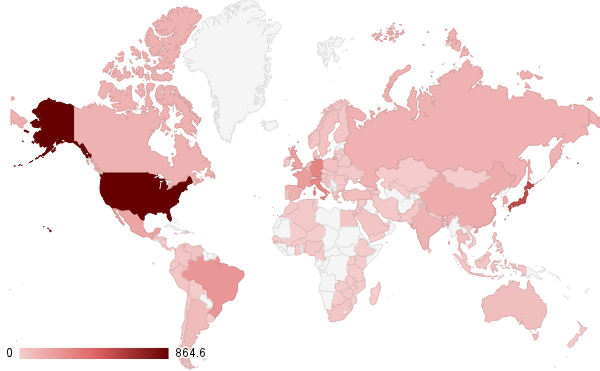
Informal Economy, %GDP (1999/2000)
What is the illegal economy?
Activities that, though are illegal, are part of the economy because they involve the production, distribution, and consumption of illicit goods and services -- such as the drug trade.
-Bandelj and Sowers (2010:206)
Formal Economy
-or-
Illegal Economy?
Photo courtesy of icantcu
Photo courtesy of Giacomo Rosso
Rain Shadow Meats, in the Melrose Market, on Capitol Hill in Seattle.
Photo courtesy of sea turtle
Photo courtesy of Loavesofbread
The Red Light District, Amsterdam
Photo courtesy of Bhupal Adhikari
Photo courtesy of Oldmaison
Photo and text courtesy of Coast Guard News
Drugs remain stacked after Operation Bahamas, Turks and Caicos (OPBAT), consisting of the U.S. Coast Guard, Royal Bahamian Police Force Drug Enforcement Unit and the Drug Enforcement Administration, located 67 bales of marijuana on Little Farmer's Cay in the Exuma island chain of the Bahamas, Sept. 27, 2013.
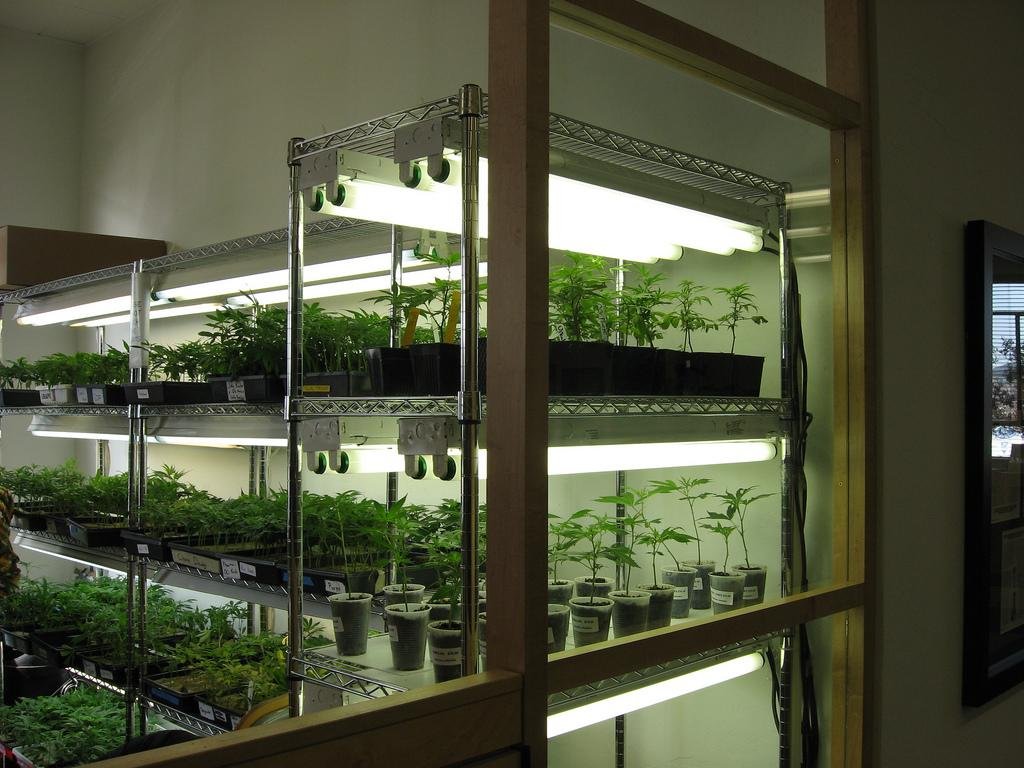
Harborside Health Clinic
Photo courtesy of Spot Us
Photo courtesy of Robert Neff
Cannabis Users, 2009 (%)

From the UN Drug Report (source)
Min = 0.1%, Median = 3.7%, Max = 21.5%
Trafficking of men, women, and children
Image courtesy of KVDP
Source: UN Office of Drugs and Crime
Number of people trafficked: 27 million (US State Dept 2011)
Measures of Economic Well-Being
- Common ways
- GDP
- GDP Growth
- Unemployment
- Inflation
- Consumer spending
- Exchange rates
- Balance of trade
- Strengths and weaknesses to each
- Differ in suitability
- Different conclusions
- Social & political constructs with varying motivations
- Proceed with not caution, but awareness
GDP (IMF 2011)
GDP Per Capita (IMF 2011)
GDP Growth, 2007-2008 (IMF 2009)
Current Accounts Balance
(CIA World Factbook 2011)
What is the state?
“A human community that (successfully) claims the monopoly of the legitimate use of physical force within a given territory.”
-Weber, Politics as a Vocation
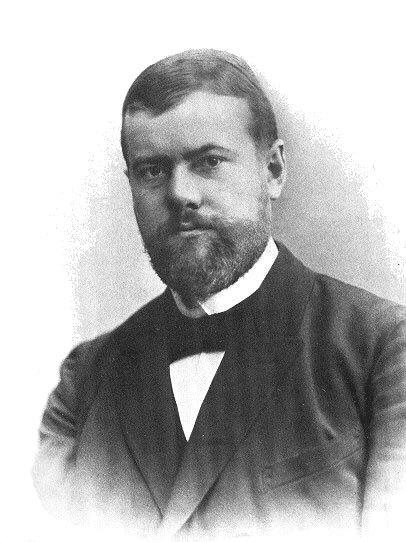
What is the state?
- A form of "rational-legal" authority, says Weber
- In contrast to traditional and charismatic authority
- Uses impersonal rules to curb the power of elites
- Obedience to principles, not individuals
- Coincides with bureaucratic organizations & economic forms
- States have power through infrastructure (Mann 1984)
- Rely upon cooperation with civil society
- Supranational organizations
- Examples?
- Important, yet less authoritative than sovereign states
- "State" versus "government"
Economy-State Dualism
- Classical perspective
- Economy ≠ State
- State → Governance
- Economy →Resource Management
- Prime question: To what degree should a state intervene in an economy?
Economy-State Embeddedness
- States ⇄ Economies
- States are constitutive of economies
- Prime question: How are states involved in economies & what are the varied consequences?
Conceptualizing Economy-State Relations
State-Economy Dualism
Economy
State
State-Economy Dualism
Economy
State
State-Economy Embeddedness
Economy
State
Civil Society
⇖⇘
⇗⇙
⇔
State-Economy Dualism: Interventionist States
- Definition
A state which actively intervenes in the economy by imposing rules or regulations on it is seen as interventionist state engaged in market manipulation.
-Bandelj and Sowers (2010)
- Types
- Public Goods State
- Stabilization State
- Social Rights State
- Protectionist State
- Socialist State
Public Goods State
- Solution to the collective action/free rider problem
- Examples?
A type of interventionist state whereby the intervention of states in the economy is justified to provide public goods, commodities, and services that markets cannot produce by themselves, such as defense of basic infrastructure. - Bandelj and Sowers (2010)

Stabilization State
An interventionist state that controls economic growth and manages economic downturns to prevent serious crises. - Bandelj and Sowers (2010)
- Offsets deleterious boom-bust effects
- Actions
- Controlling the monetary supply
- More extensive Keynesian types of intervention
- Monetary policy
The process by which the monetary authority of a country controls both how much money circulates in the economy (monetary supply) and how much it costs (interests rates). - Bandelj and Sowers (2010)
Examples?
Social Rights State
Protects its citizens from market forces and assures provisions for illness, injury, and old age. - Bandelj and Sowers (2010)
- Citizenship entails social rights and well-being, in addition to civil and political rights
- Examples?
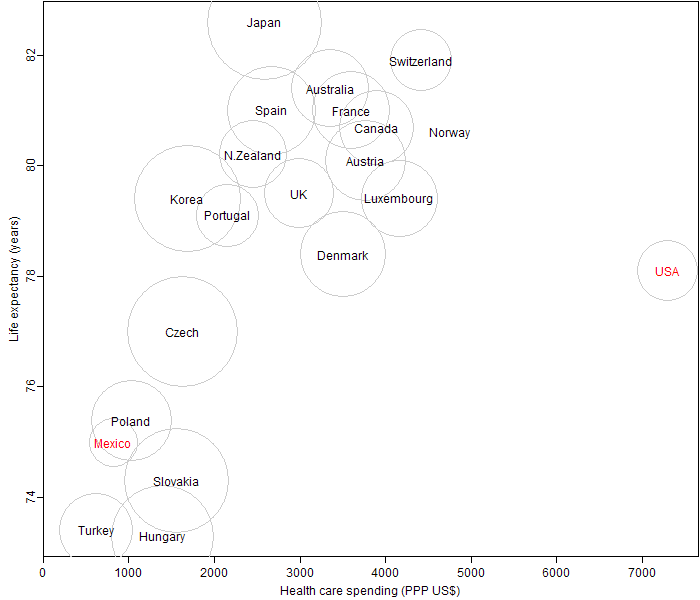
Circles scaled by doctor visits per capita
Figure by Andrew Gelman
Protectionist State
A type of interventionist state where intervention in the economy occurs through protectionism, as seen in mercantilist states in the sixteenth to eighteenth centuries. - Bandel and Sowers (2010)
- Uses
- Tariffs on international trade to encourage domestic economic production
- Lessens international competition on domestic market
- Examples?
Socialist State
A type of interventionist state which can be seen as an extreme example of social rights and protectionist states. - Bandel and Sowers (2010)
- Explanation
- Intermediary stage from capitalism to communism
- State assuages inequality and human alienation resulting from capitalism
- Goals
- Social protection ensured
- Equality and justice
- Centralization of economic pursuits
- Eradication of private property
Economy-State Embeddedness
Economy-State Embeddedness
- Economies are constantly being shaped by state actions
- All developing economies have tremendous state involvement
- Economy-State Dualism ultimately boil down to normative debates
- It isn't "useful" to treat these institutions as discrete, independent entities
- The relationship isn't one of "restraint." States enable markets.
- Big question:
What is the role of ideas, politics and institutions for shaping economic policy-making and thus the course of economic development, domestically and globally? - Bandelj and Sowers (2010)
Economy-State Embeddedness
FICTITIOUS COMMODITIES (Polanyi 1957)
- Three types
- Money
- Land
- Labor
- Meanings of "Fictitious"
- Treating these goods as produced for market sale
- Belief that these goods can be created to meet demand
- The state must integrate them into the market, curtailing their usage, to prevent destruction
- No assurance the regulation will be responsible
Goods that are not made with the purpose of market sale however the demand for these goods must be "regulated to prevent exhaustion to the point of annihilation."
Economy-State Embeddedness
Block & Evans (2005) Propositions
- States and economies are mutually constitutive
- States and economies exist among and interact with established institutions that affect both spheres.
- I.e., "Embeddedness"
- State and economy embeddedness changes over time with institutional innovation
These embedded institutions are better known as "civil society."
State-Economy Embeddedness
Economy
State
Civil Society
⇖⇘
⇗⇙
⇔
Economy-State Embeddedness
Civil Society
- Voluntary relationships & associations
- Civil society includes
- Trade associations
- Fraternal organizations
- NGOs
- Labor unions
- Social movement organizations
- Religious congregations
- ...
- The Public Sphere
- Characterized by reciprocity
- Government restrictions on civil society
State Influence
Individual Actions
- Working
- Consuming
- Paying taxes
- Receiving social benefits
- Using public goods
- Real estate and financial investments
State Influence
Firm Actions
- Producing
- Selling
- Employment
- Taxes
- Using public goods
- Investing
- Subsidiaries (domestic and international)
State Influence
Systems of economic Organization
- Capitalism and variants
- Socialism and variants
- Transition economies
Property
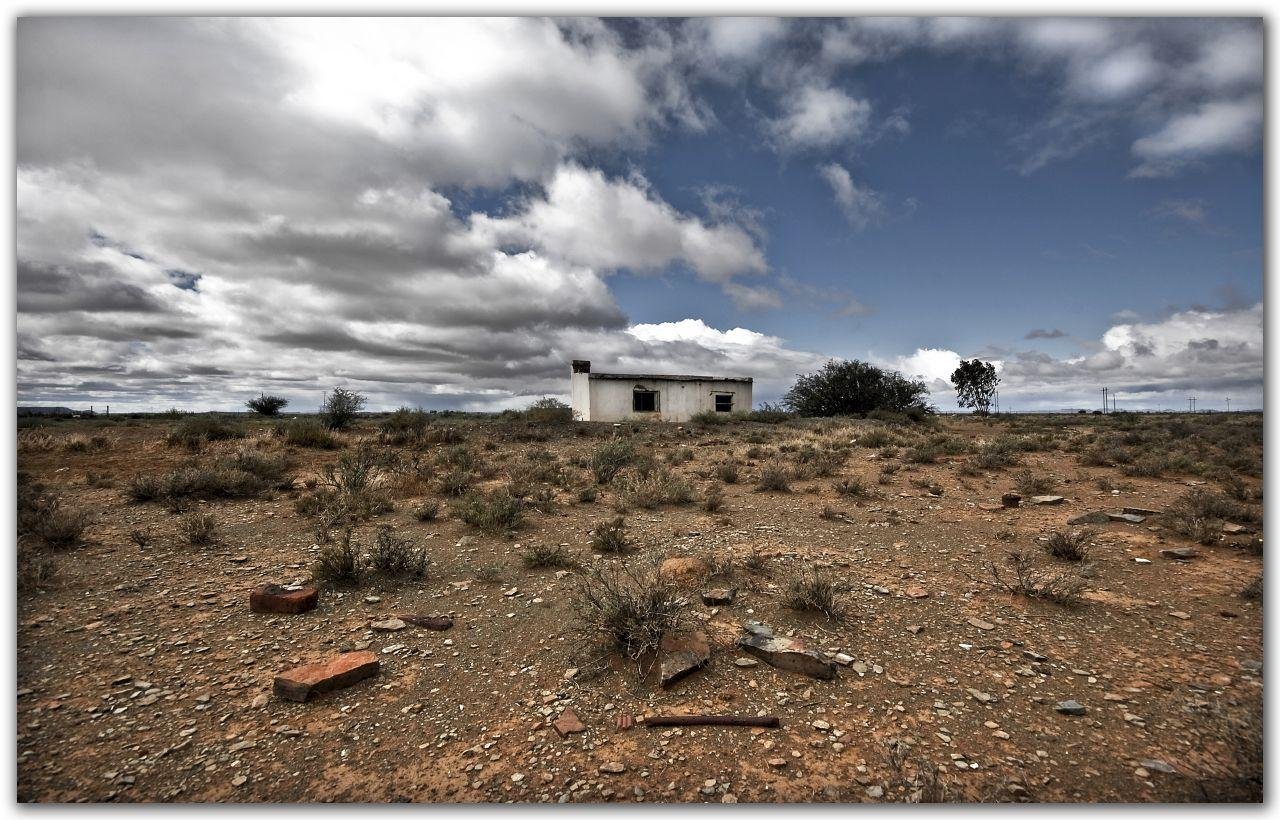
Picture courtesy of André van Rooyen
Capitalism
An economic system in which the means of production are mostly privately owned and operated for profit, and where the principal economic organization is free-market competition. - Bandelj and Sowers (2010)
Socialist States
A type of interventionist state which can be seen as an extreme example of social rights and protectionist states. - Bandelj and Sowers (2010)
Market Exchange
Redistribution
State defines property rights
State defines property rights
Capitalism
The Classic Theorists
- Adam Smith
- David Ricardo
- Marx
- Weber
Adam Smith
-
Wealth of Nations (1776)
- Didn't use word "capitalism"
- Markets are fair
- Disliked
- Monopolies, Tariffs, & Duties
- Which interventionalist state does he object to?
- State has role in
- Infrastructure, defense, justice, protecting property rights, education, & religion (?)
- Which interventionalist state does he favor?
- Supported progressive taxation
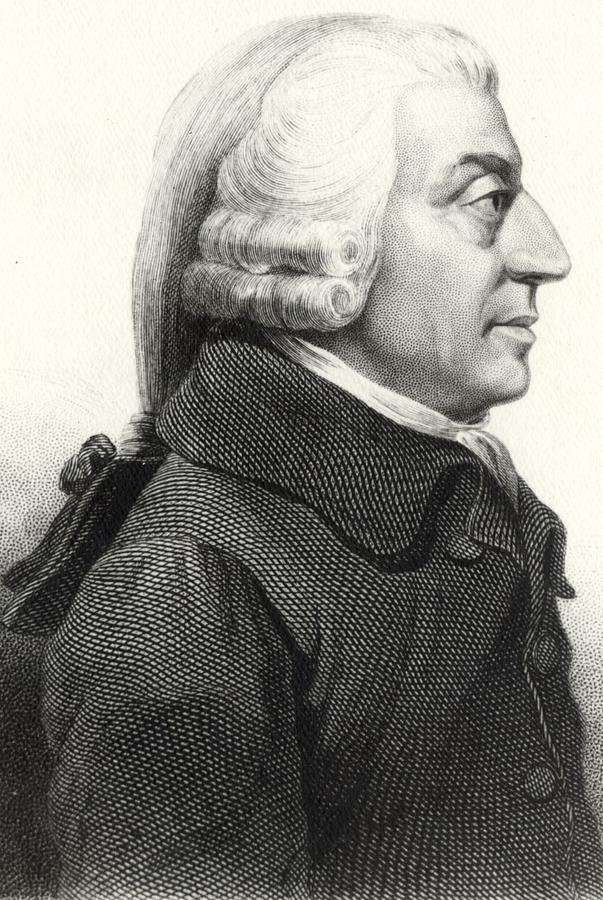
Adam Smith
The Invisible Hand
- Economy is one that naturally promotes self-regulation between buyers & sellers
- Governmental regulation prevents market regulation
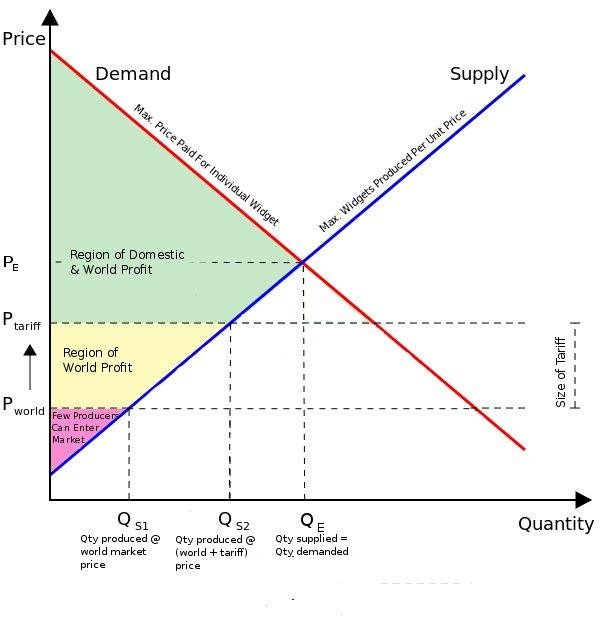
Image courtesy of Nwoebcke
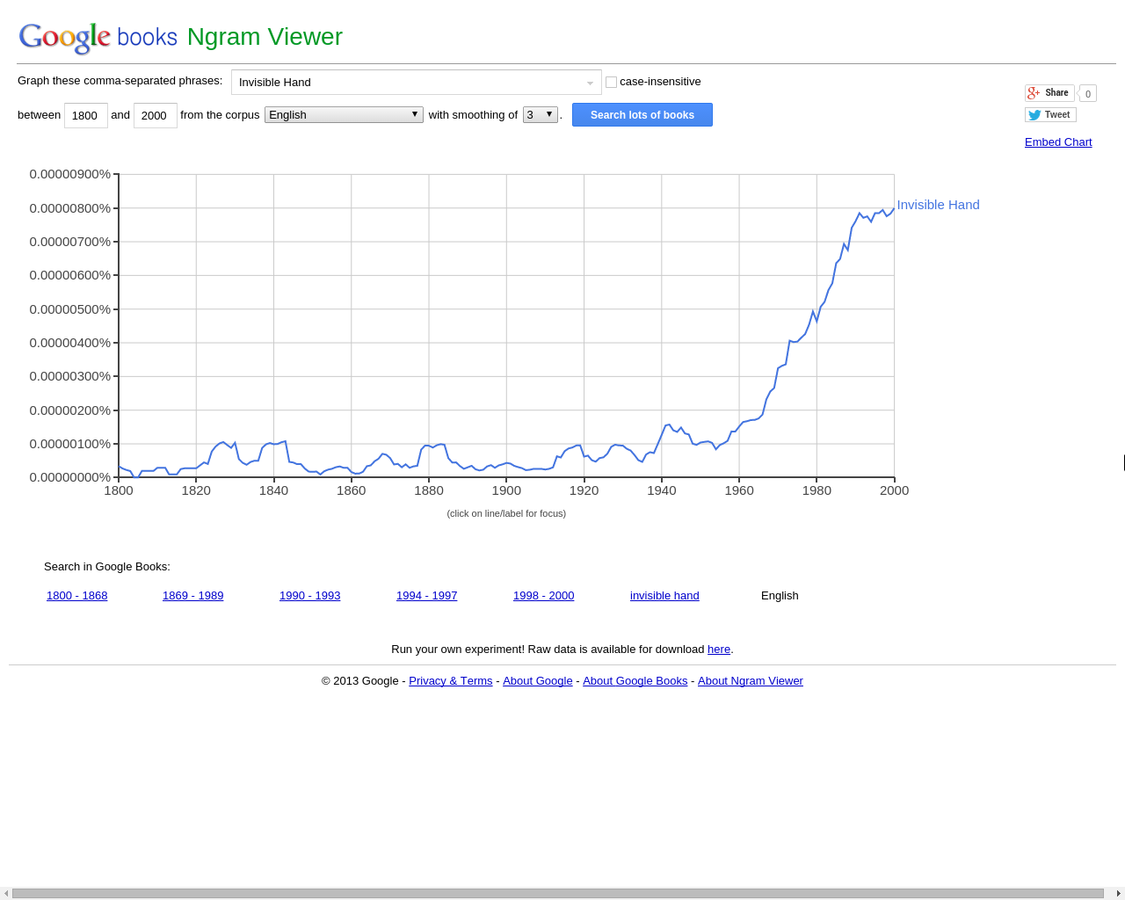
Wealth of Nations
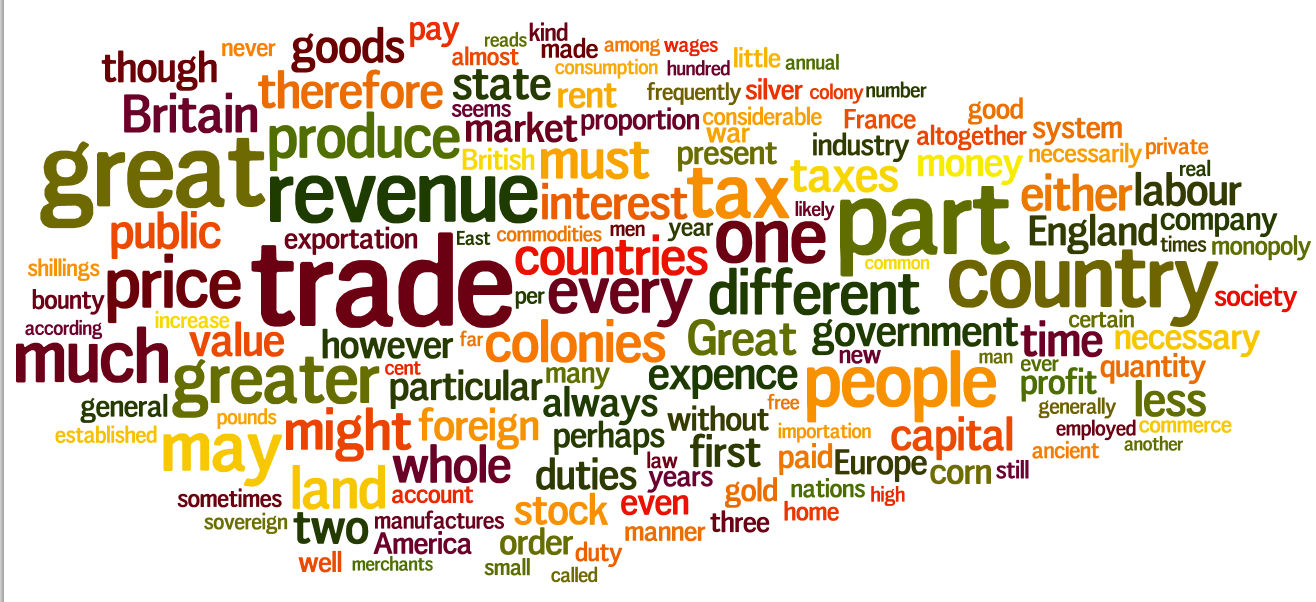
David Ricardo
- Principles of Political Economy & Taxation (1817)
- Comparative Advantage
- Focus on trade
- Relative efficiencies
- Specialization
- Portugal & England
- Portugal can make wine & cloth with less labor costs than England
- Cloth is easier to make than wine in England
- Solution? Portugal only makes wine, England only makes cloth.
- Implications for state on mercantilism?

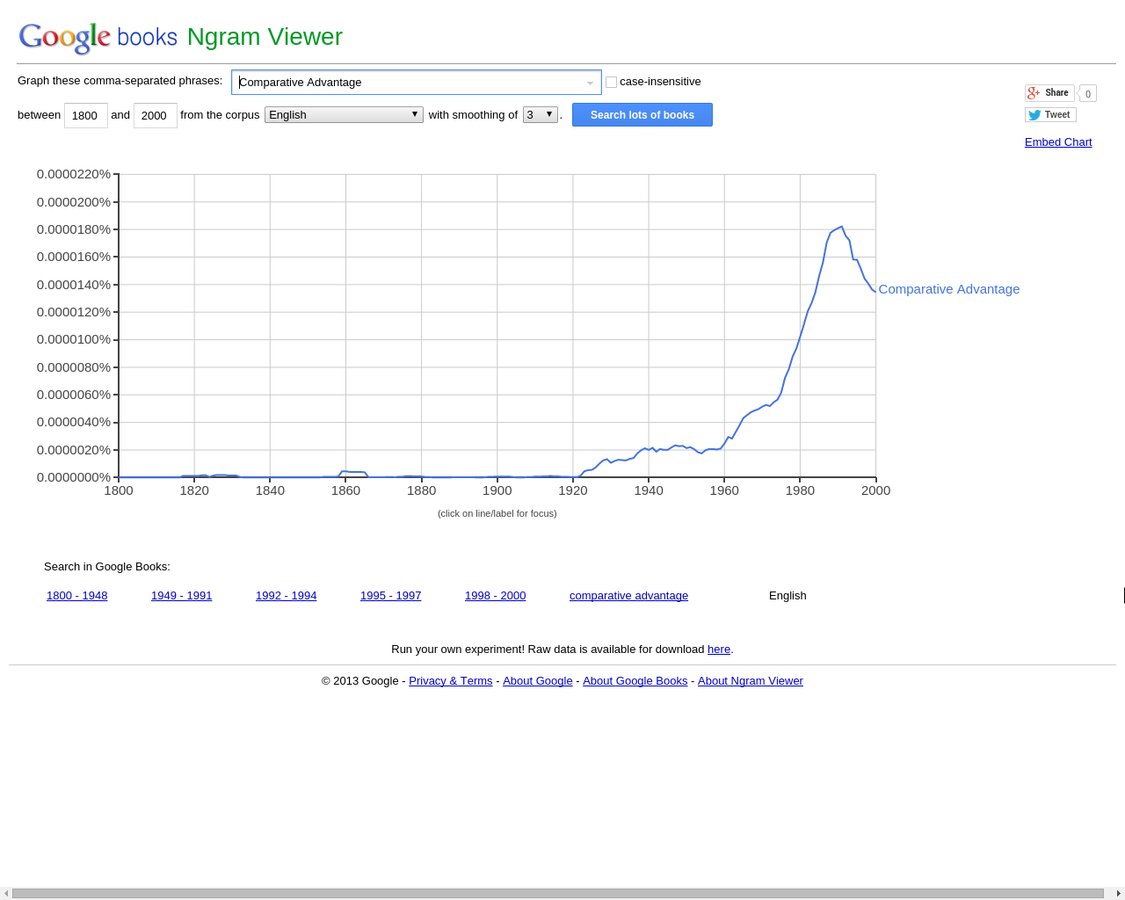
Principles of Political Economy and Taxation
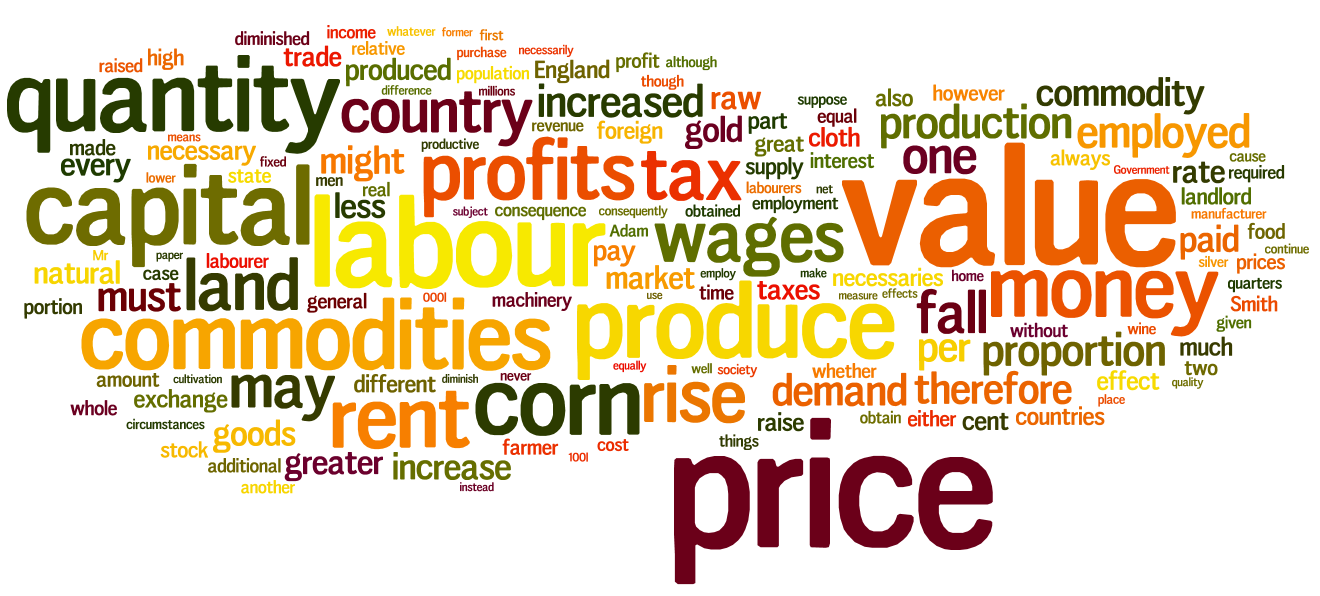
Karl Marx and Friedrich Engels
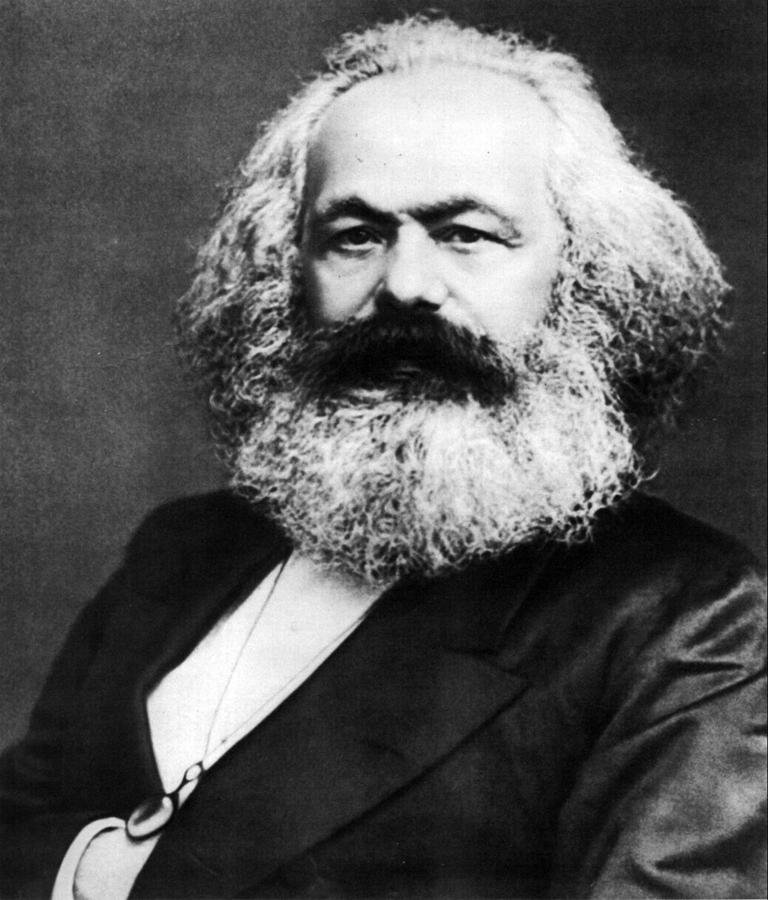
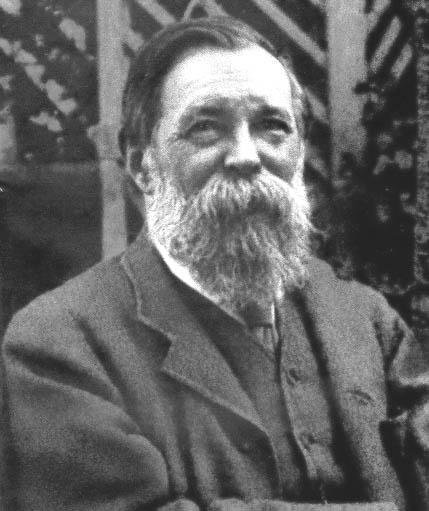
KARL MARX AND FRIEDRICH ENGELS
- Capitalism is defined by the means of production
- Dialectical conflict: Owners vs. Workers
- Also, Bankers vs. Investors; Landlords vs. Renters
- The relationship of production is built upon exploitation
- Workers own labor power until they sell it on the market
- Owners of capital are those who buy labor use it for investment returns
- On the state
- A strong state was not the ultimate goal of Marx & Engels. A communist society would be stateless.
- The state has been a bourgeois administrative tool
- Feudalism ⇨ Capitalism ⇨ Socialism ⇨ Communism
- Socialism does require state involvement
Manifesto of the Communist Party
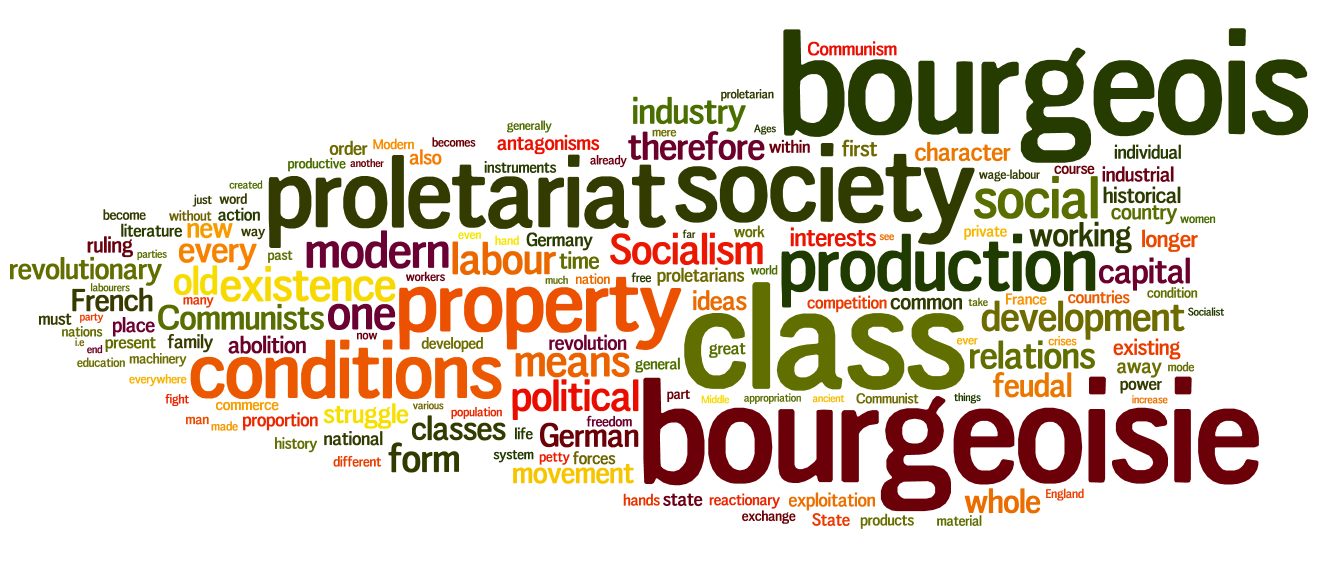
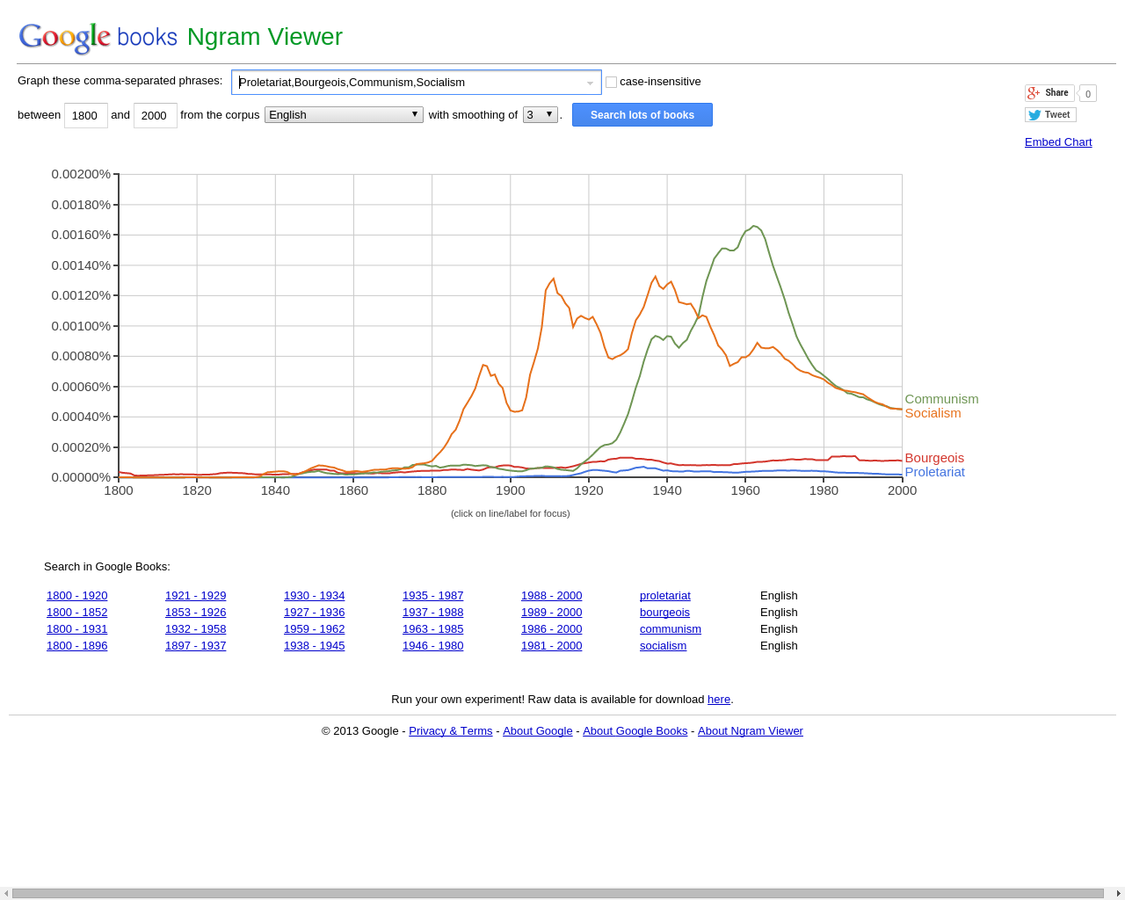
Max Weber
- State Capitalism Implications
- Impartiality
- Predictability
- Ease of deelopment & expansion of capitalism

Bureaucracy
...administrative organizations with specific structural features, which include a focus on rules, defined roles in the division of labor, records, and meritocratic rewards - Bandelj and Sowers (2010)
Bureaucracy
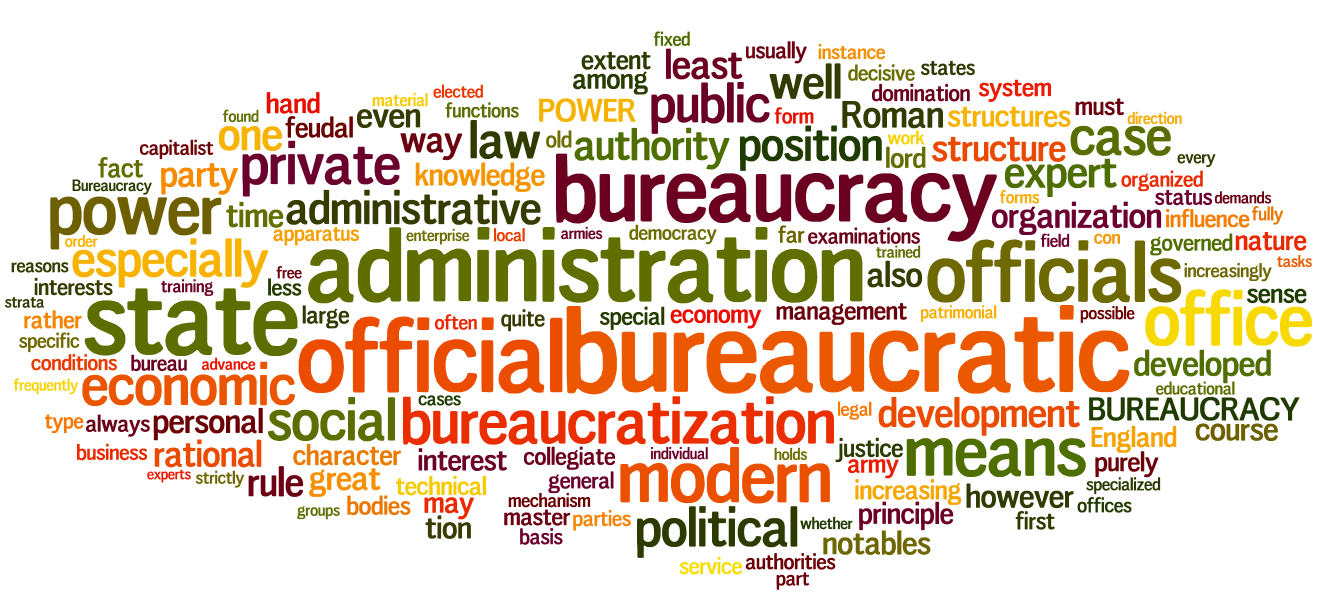
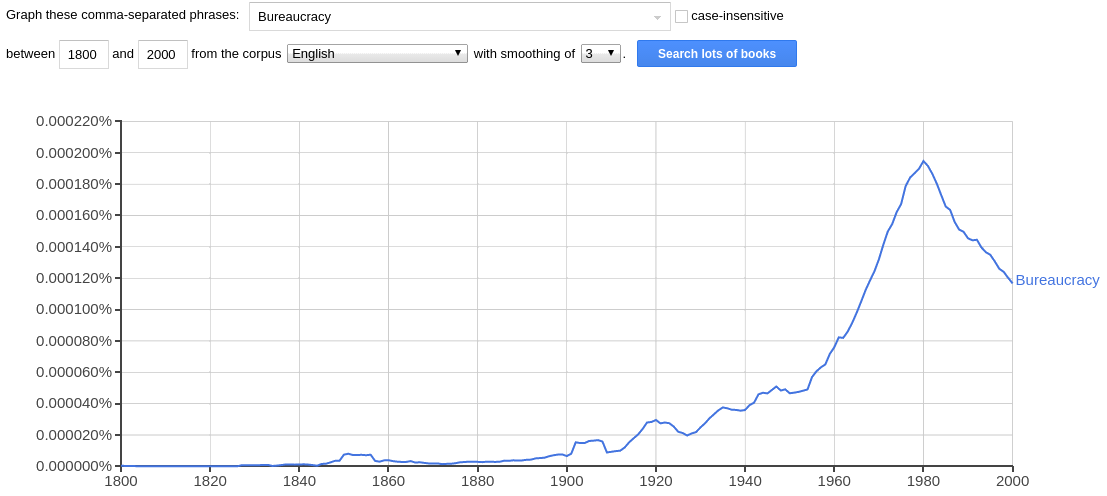
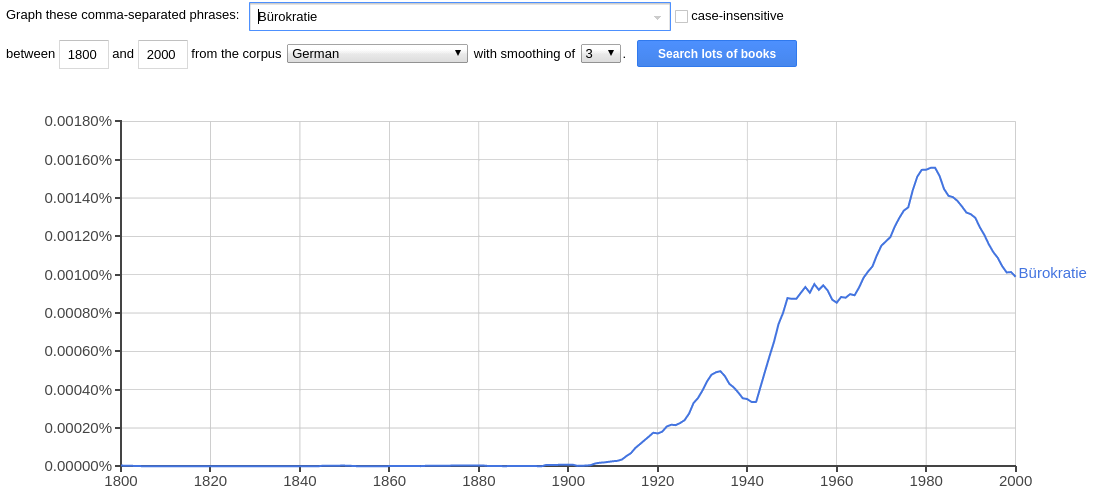
From Max Weber
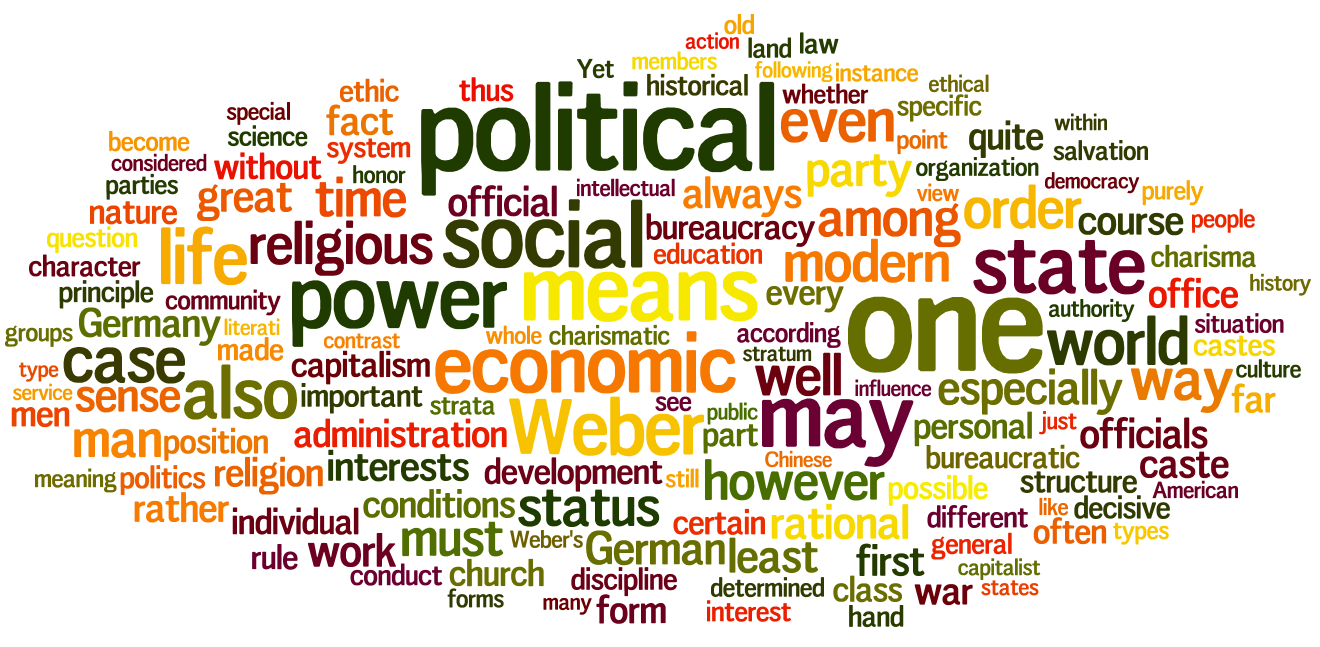
CENTRAL INSTITUTIONS OF CAPITALISM
-
Competition
-
Market exchange
-
Private property
-
Antitrust
CENTRAL INSTITUTIONS OF CAPITALISM
COMPETITION
Free market contest between firms and other actors on the market which is often protected by states through antitrust laws. - Bandelj & Sowers (2010)
CENTRAL INSTITUTIONS OF CAPITALISM
MARKET EXCHANGE
The primary principle of economic organization where buyers and sellers, whether individuals or firms, exchange goods and services on the market. - Bandelj & Sowers (2010)
- Alternatives: Redistribution, Reciprocity
- Primary exchange system after General Enclosures Act
CENTRAL INSTITUTIONS OF CAPITALISM
PRIVATE PROPERTY
Private property includes the right to exclusive control over the use of a resource, and the right to sell, give, or rent any part of the resource. These rights are legally protected social relationships that allow actors to exclude others from the opportunity to use some resource. - Bandelj & Sowers (2010)
CENTRAL INSTITUTIONS OF CAPITALISM
Antitrust
Legislation regulating competition among firms, involving the prohibition of market dominance, the restriction of cartels, and the limiting of mergers, which had major repercussions for the American economy, including facilitating the emergence of large corporations. - Bandelj & Sowers (2010)
Private Property (Bandelj & Sowers 2010)
Components of Private Ownership
- Control over property
- Use and application
- Modifications
- Set terms of Access
- Permit some to use property
- Prevent others from using property
- Right to transfer ownership
- Sell
- Give
- Rent
Private Property (Carruthers & Ariovich 2004)
Dimensions of Property
- Object: What can be owned?
- Subject: Who can own?
- Use: How can the property be used lawfully?
- Enforcement: What are the repercussions of unlawfulness?
- Transfer: How can ownership be changed from one party to another?
Each dimension is determined by the state.
Vincent Vega on Comparative Property Rights
Private Property (Carruthers & Ariovich 2004)
Subject
Object
Ownership
Private Property (Carruthers & Ariovich 2004)
Subject
Object
Ownership
Who can own?
?
Who can own?
- Natural Persons
- Age
- Gender
- Nationality
- ...
- Fictive Persons
- Examples?
- Dimensions
- Profit vs. Nonprofit
- Public vs. Private
Private Property (Carruthers & Ariovich 2004)
Private Property (Carruthers & Ariovich 2004)
Subject
Object
Ownership
What can be owned?
?
What can be owned?
- In no society can everything be owned
- Definitions vary over time and over polities
- Intangible property
- Ideas or Intellectual property
- Financial properties
- Bonds
- Shares
- Trademarks
- Patents
- Insurance policies
Private Property (Carruthers & Ariovich 2004)
Private Property (Carruthers & Ariovich 2004)
Subject
Object
Ownership
What can be Done with the Object?
?
What can be done with the object?
- Zoning
- Contracts
- Qualifications to use
- Taxes
- Licenses
- Examples of limits?
Private Property (Carruthers & Ariovich 2004)
Private Property (Carruthers & Ariovich 2004)
Subject
Object
Ownership
Subject
Object
Ownership
How are property rights enforced?
-OR-
How are property rights enforced?
- Formal methods by the state
- Police
- Lawsuits
- Private security
- Cultural norms
- Shift from de facto to de jure
Private Property (Carruthers & Ariovich 2004)
Private Property (Carruthers & Ariovich 2004)
Object
Ownership
Non-Ownership
How are property rights Transferred?
Private Property (Carruthers & Ariovich 2004)
Object
Ownership
Non-Ownership
How are property rights Transferred?
How can property rights be transferred?
- Sales
- Gifting
- Inheritance
- Examples of limits on transfer?
- Note: Squatters
Private Property (Carruthers & Ariovich 2004)
Socialism
- Collective ownership of the production process
- Workers have a stake in ownership
- Redistribution instead of market exchange
- Economic equality
- Fewer differences between the rich and poor
- Central Institutions to Achieve those Characteristics
- Collective property
- Emphasizes humanity and equality
- Centralized planning
- Remove market inefficiencies
- Administered through states and parties
- Five-year plans
- Full employment
- Equality in labor market
- Increase in production results in prosperity
- Collective property
Transitional Economies
History
- Soviet economies improving until 1970s
- Foreign debt
- "Inflexibility"
- Oil crisis
- 1980s
- Domestic political reforms
- Social movements with international support
- Fall of Berlin Wall
Transitional Economies
- Transformation philosophies
- "Shock therapy" and "Big Bang"
- Institution building alongside existing infrastructure
- State agency of their own transition
- State contracts with private firms
- Foreign direct investment
- Successes and failures
- Generally successful, except in Russia
- Loss of social provisions
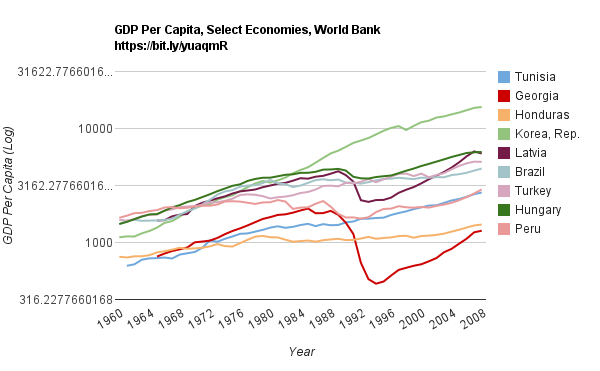
Socialism and Income Inequality
- Gini Coefficient
- 0 = Complete Equality, 1 = Complete Inequality
- Expressed here as a %, ranges from 0 to 100%.
- Sources
- Late-1980s (1986-1988) & Late-1990s (1996-1998)
- Methods
- T-test: Late-1980s, Late-1990s, Difference
- Bootstrapped simulations (100,000) conf. intervals
SOCIALISM AND INCOME INEQUALITY
Countries
Albania, Algeria, Argentina, Armenia, Bangladesh, Belarus, Bolivia, Botswana, Brazil, Bulgaria, Burkina Faso, Burundi, Cameroon, Chile, Colombia, Costa Rica, Cote d'Ivoire, Croatia, Czech Rep., Denmark, Djibouti, Dominican Rep., Ecuador, Egypt, El Salvador, Estonia, Gambia, Georgia, Ghana, Guatemala, Guyana, Honduras, Hong Kong, Hungary, Iran, Jamaica, Jordan, Kazakhstan, Kenya, Korea (Rep.), Kyrgyzstan, Laos, Latvia, Lesotho, Lithuania, Macedonia (FYR), Malawi, Malaysia, Mauritania, Mexico, Moldova, Mongolia, Mozambique, Nepal, New Zealand, Nicaragua, Nigeria, Pakistan, Panama, Papua New Guinea, Paraguay, Peru, Philippines, Poland, Portugal, Romania, Russia, Singapore, Slovak Republic, Slovenia, Sri Lanka, Thailand, Trinidad and Tobago, Turkey, Turkmenistan, Uganda, Ukraine, Uruguay, Uzbekistan, Venezuela, Vietnam, Yemen (Rep), Zambia
SOCIALISM AND INCOME INEQUALITY
Hypotheses
- Late-1980s
- Socialist Avg Gini < Other Avg Gini
-
Late-1990s
- Transitional Avg Gini < Other Avg Gini
- Difference between late-1980s & late-1990s
- Transitional Avg Gini Increased > Others
SOCIALISM AND INCOME INEQUALITY
Results
- Late-1980s
- t-value: -9.554***
- Mean Gini's: 24.61 vs 45.40. Diff = 20.80
- 14.60 < True Difference < 25.94 (99.9% CI)
- Late-1990s
- t-value: -6.19***
- Mean Gini's: 33.70 vs 44.41. Diff = 10.71
- 6.19 < True Difference < 15.02 (99% CI)
- Difference between Late-1980s and Late-1990s
- t-value: 3.62***
- Differenced Mean Gini 9.03 vs 1.24. Diff = 7.79
- 1.86 < True Difference < 13.07 (99% CI)
Money

Image courtesy of Tropenmuseum
An EXERCISE in GENEROSITY...
Money's Relevance to the State
- One of the three fictitious commodities
- Meaning?
- Governments decide
- How much money to create
- How much the money is worth
- Printing money is a sovereign right of states
- The rise of state-controlled currency correlated with the rise of nation-states.
- New currencies introduced following independence
- Expression of nationalism...
Nations, States, and Nation-States
A human community that (successfully) claims the monopoly of the legitimate use of physical force within a given territory. - Weber
State
Nation
A human community unified by a shared language, culture, ethnicity, history, and/or heritage
Nation-State = Cultural community + territory
- Dominant political unit today
- Alternatives: city-states, dynasties, empires, etc
Money often expresses national imagery
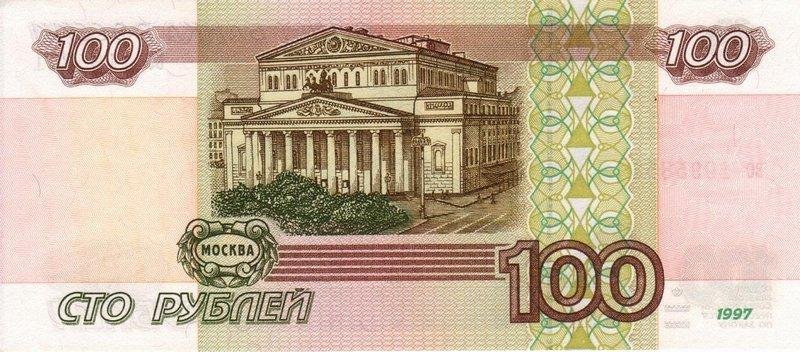
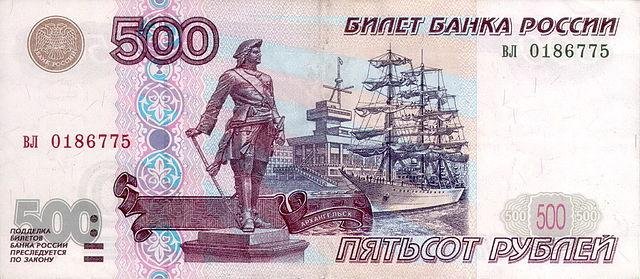
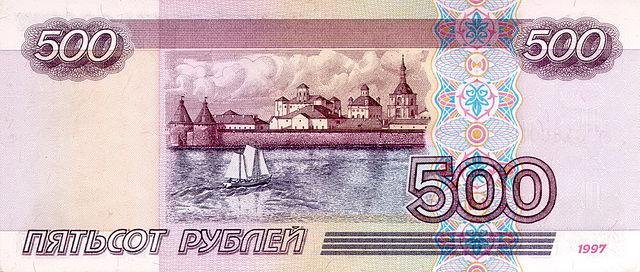
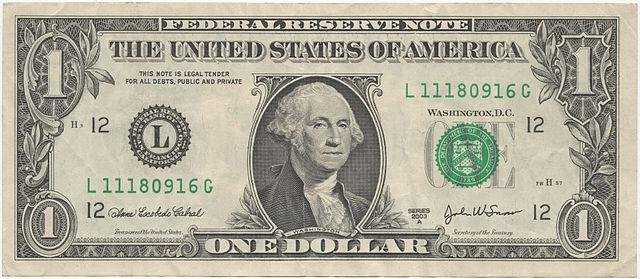
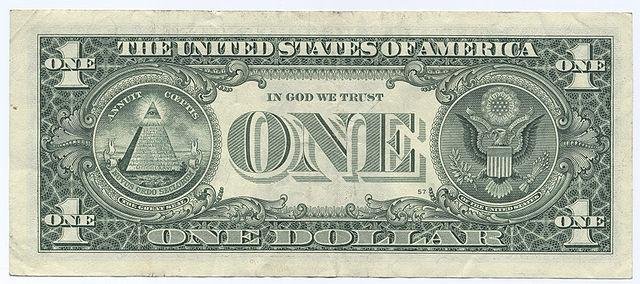
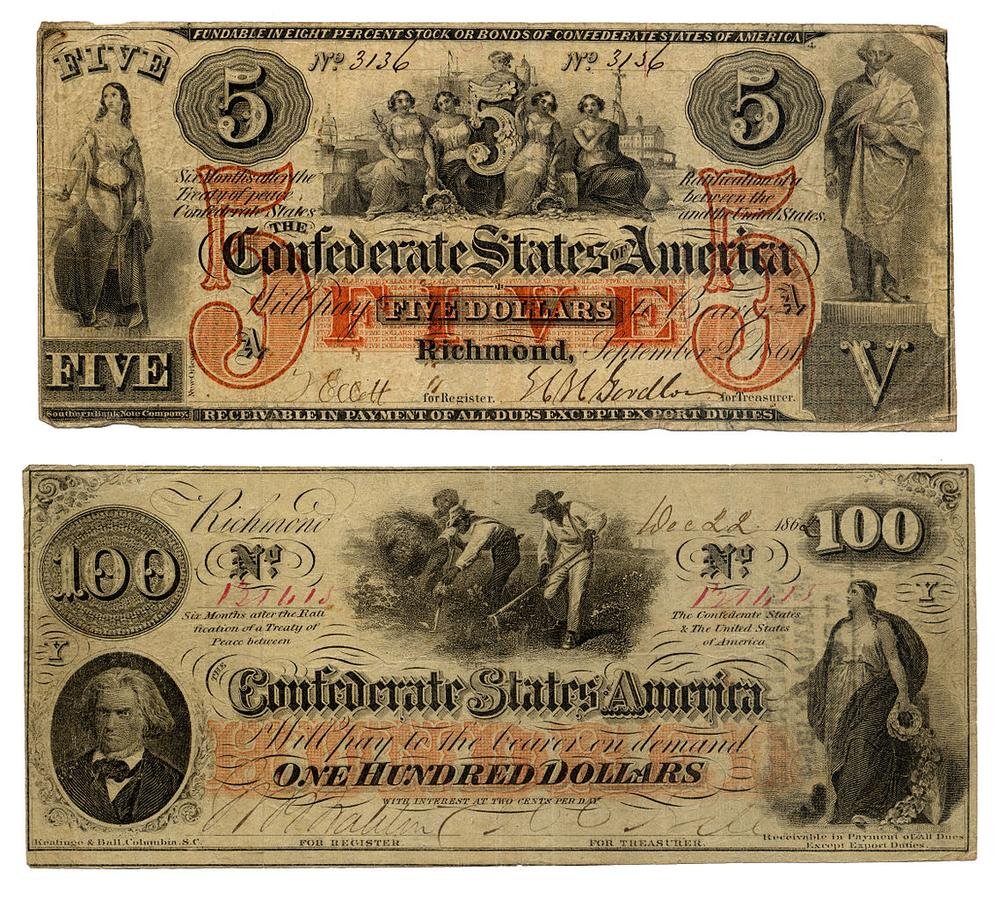
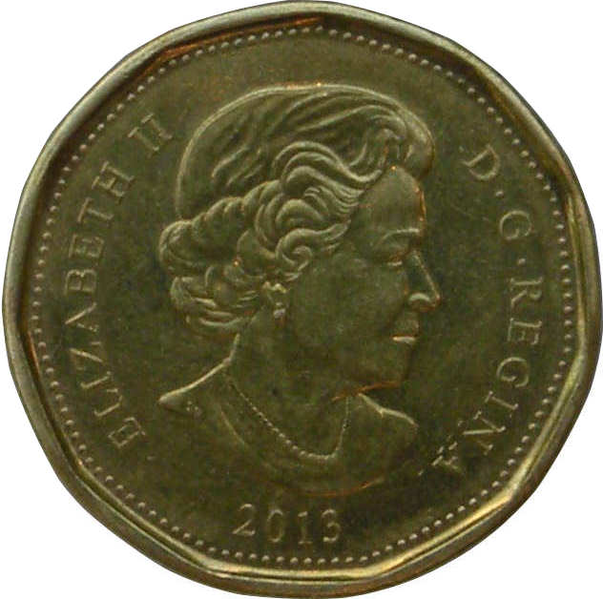
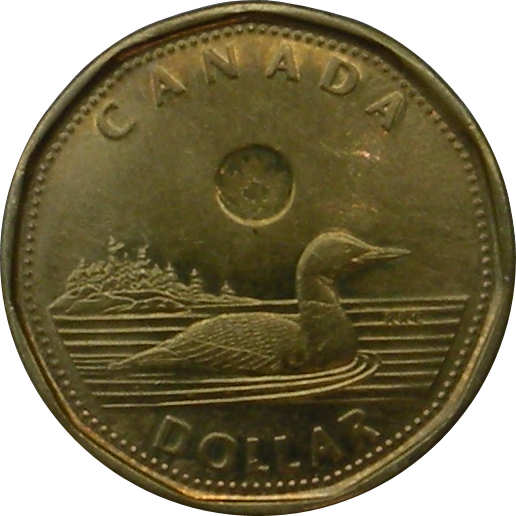
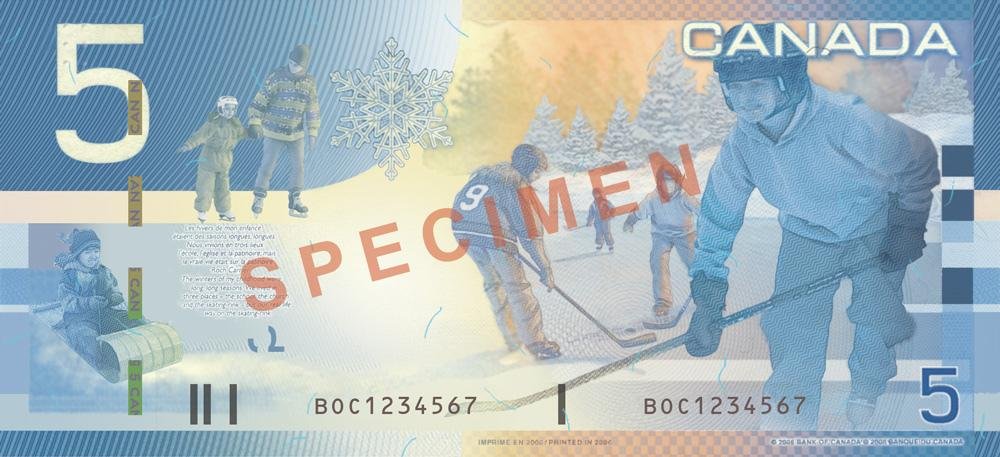
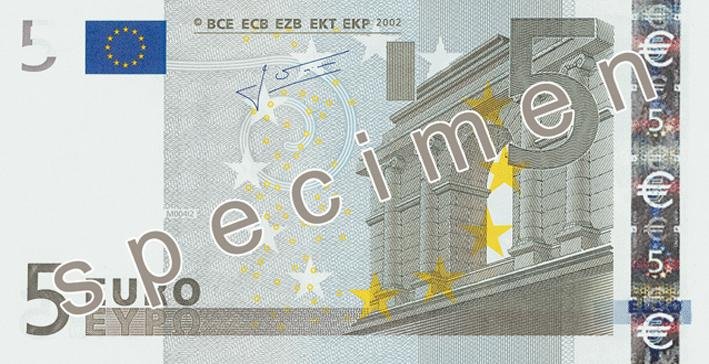
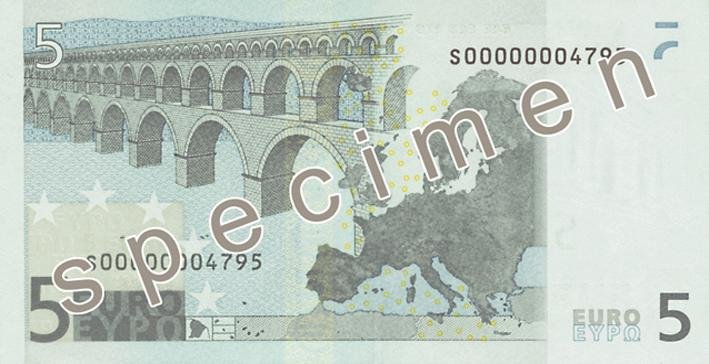
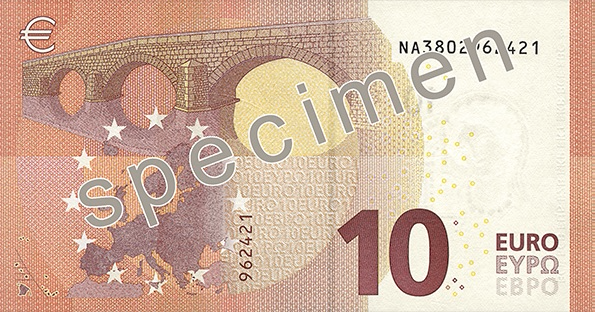
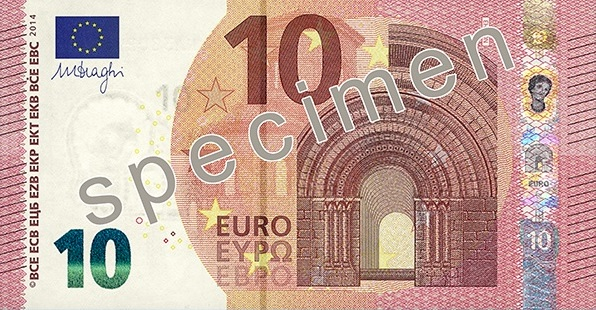
History of Fiat Money
- Previous modes of exchange
- Barter and payments in kind. Examples? Problems?
- Common exchange mediums: spices, coco, shells, etc
- Precious metals in coins. Problems?
- Fiat money
- Not intrinsically worth anything
- Value corresponds to a social agreement
- Gold standard
- Currency used to reflect a state's gold reserves
- Bretton Woods System replaced by floating exchange
Monetary Policy
the process by which the monetary authority of a country controls both how much money circulates in the economy (monetary supply) and how much it costs (interest rates) - Bandelj & Sowers (2010)
Which type of interventionalist state is this?
Goal of smoothing out boom and bust periods
Expansionist, "loose"
- Increases money supply
- Good when unemployment high, recessions
- Lowers interest rates
- Encourages spending
- Encourages spending
Contractionist, "tight"
- Decreases money supply
- Good when unemployment low,economy good
- Raises interest rates
- Encourages saving
Monetary Policies
Monetary Policy
- Monetary policy has direct implications for all loans
- Which actors engage in monetary policy?
- The decision to raise or lower the federal fund rate requires "sense-making" and market interpretation
- Bad monetary policy can result in...
- Hyperinflation, stagflation, high unemployment, inability to import or export, recession, etc
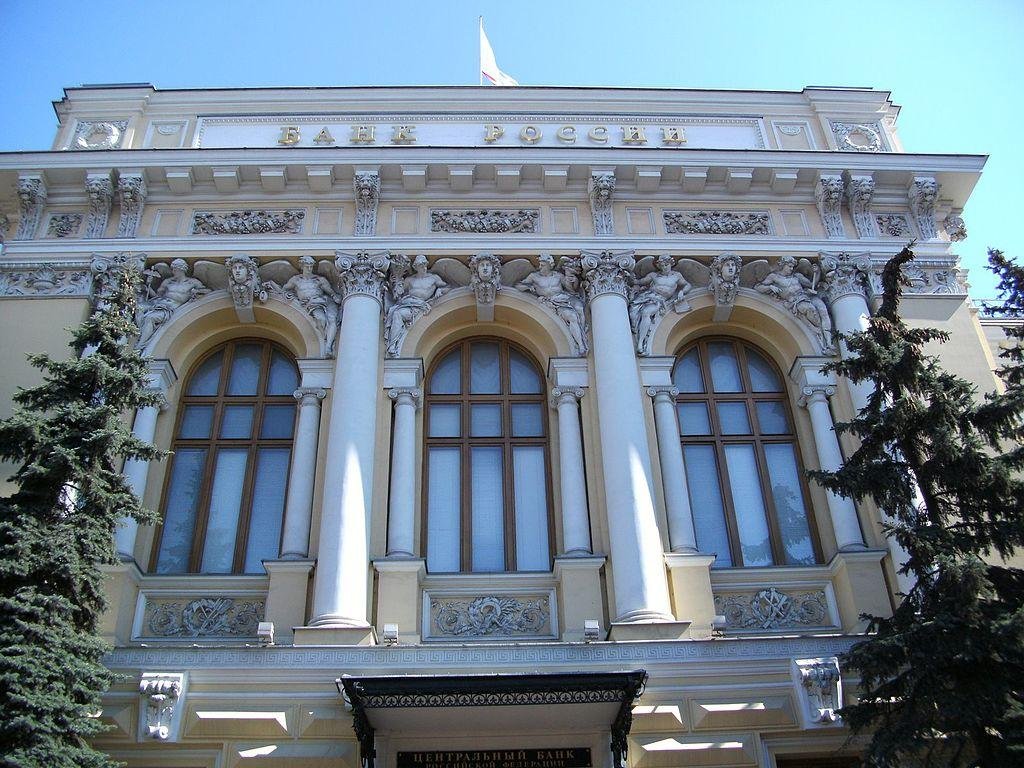
Picture courtesy of Kuba
Fiscal Policy
government actions of borrowing, spending, and taxation in order to ensure economic prosperity - Bandelj and Sowers (2010)
- Popularized by John Maynard Keynes
- Advocated for active fiscal policy
- Rationale: it stimulates the economy
- Main components
- Taxing
- Spending
Taxing
- Social contract
- Public goods have a cost
- Cross-national variation by
- Rates
- Types
- Corporate
- Individual
- Goods and Services/Value Added Tax (VAT)
- Who pays how much of the pie?
- Flat, progressive, and regressive taxes
- Politicians typically campaign on changes to taxation
- What are some of the social consequences of tax policy?
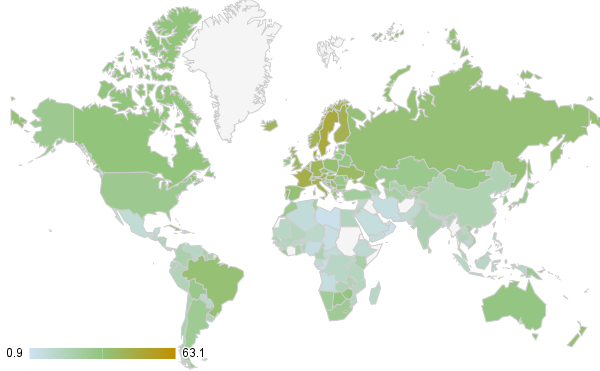
Tax Revenue, as % GDP
Heritage Foundation
Spending
- Variations on...
- How much a government spends?
- What does a government spend money on?
- Funding
- Taxes
- Spending state reserves
- Selling assets
- Examples?
- Issue bonds (loans)
- Deficit vs. Surplus
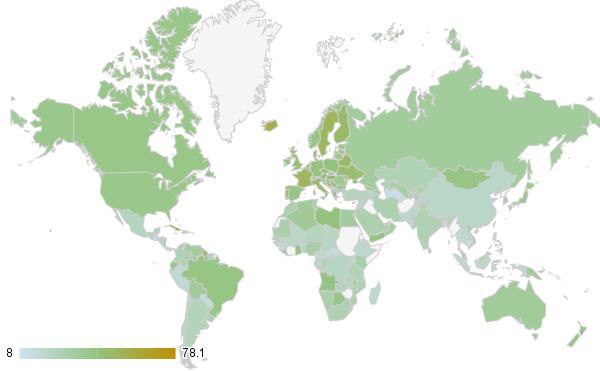
Government Spending, as % GDP
Heritage Foundation
Spending
- Min: 8%
- Median: 31.1%
- Mean: 33.45%
- Max: 114.6%
- Standard Deviation: 14.68
Taxes
- Min: 0.9%
- Median: 20.2%
- Mean: 22.13%
- Max: 63.1%
- Standard Deviation: 11.50
Correlation: 0.59
Though source is questionable...
Debtor-Creditor Relations
Contracts
- Legally binding contracts implicate state involvement
- What happens if you don't pay your credit card bills?
DEBTOR-CREDITOR RELATIONS
Financialization
A term describing how the manipulation of money and credit, or investments in financial instruments and lending and borrowing, have become ever more important sources of profit - Bandelj and Sowers (2010)
DEBTOR-CREDITOR RELATIONS
Financialization
- Making profit from lending and borrowing practices
- In US, finance sector has overtaken manufacturing
- Causes
- Deregulation
- High interest rates
- Foreign capital investment
- Maybe biggest cause behind Recession of 2007
Welfare States and Public Goods
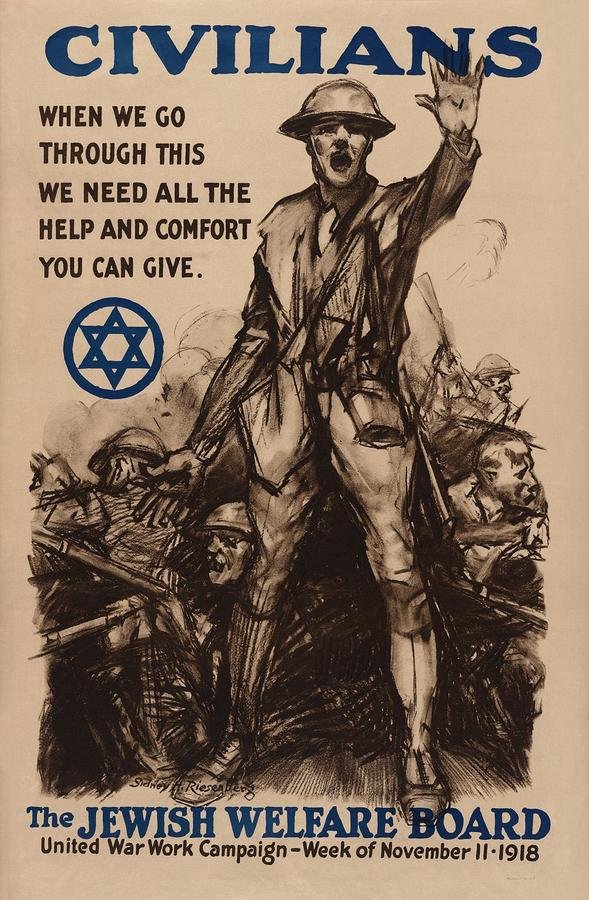
% American English books containing "welfare state"
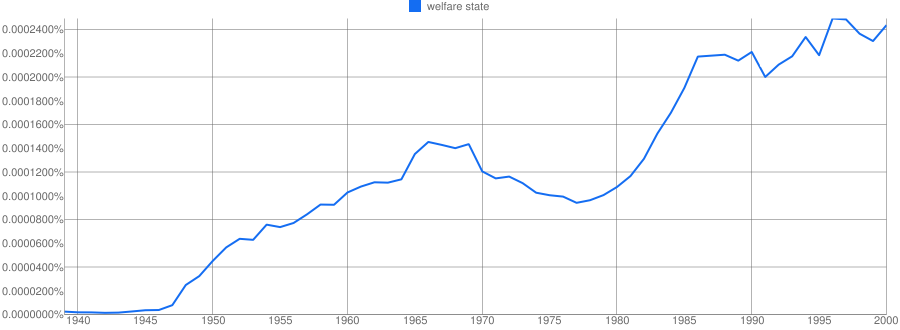
Search Correlates
"policy" (#1, r=0.9023), "support of" (#7, r=0.8700), "critical" (#9, r=0.8681)...
"psychological" (#13, r=0.8639), "mentally" (#31, r=0.8565), "culture" (#38, r=0.8528)
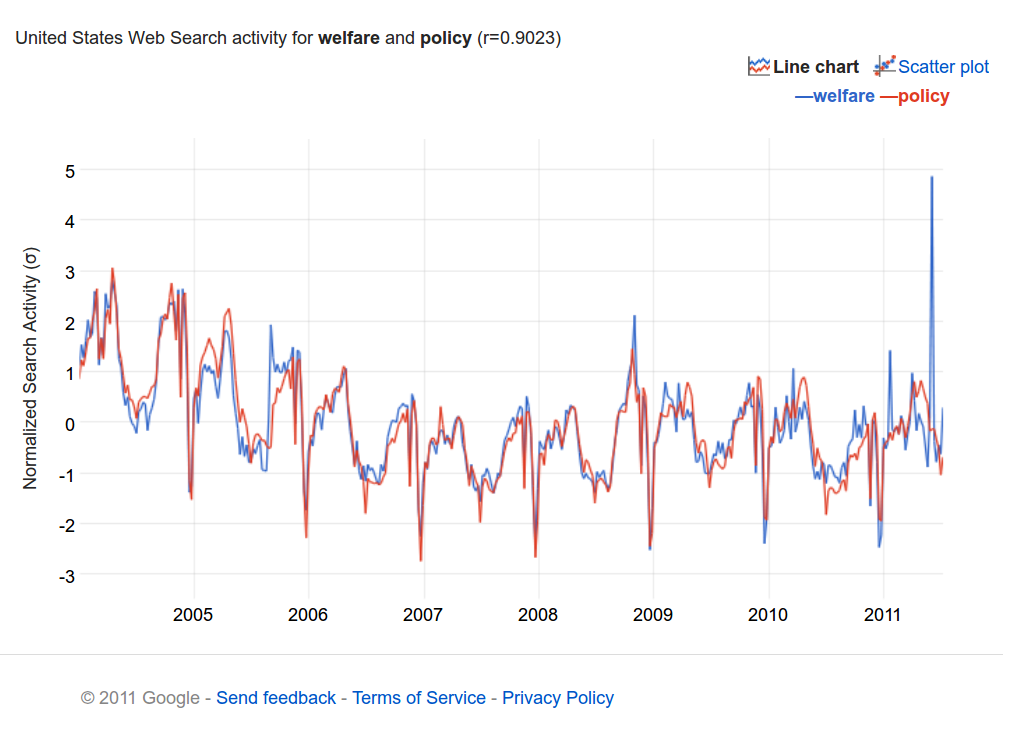
Welfare States
- Bad, boring question
- "Should the state provide welfare to its citizens?"
- Good questions
- "How much do states provide in welfare?"
- “What accounts for the variations in spending?”
A state that sets limits to market forces and institutionalizes different kinds of guarantees regarding the social rights of its citizens, including the provision of a minimum income, assistance to those who cannot work, and other social services -- Bandelj and Sowers (2010)
Labor
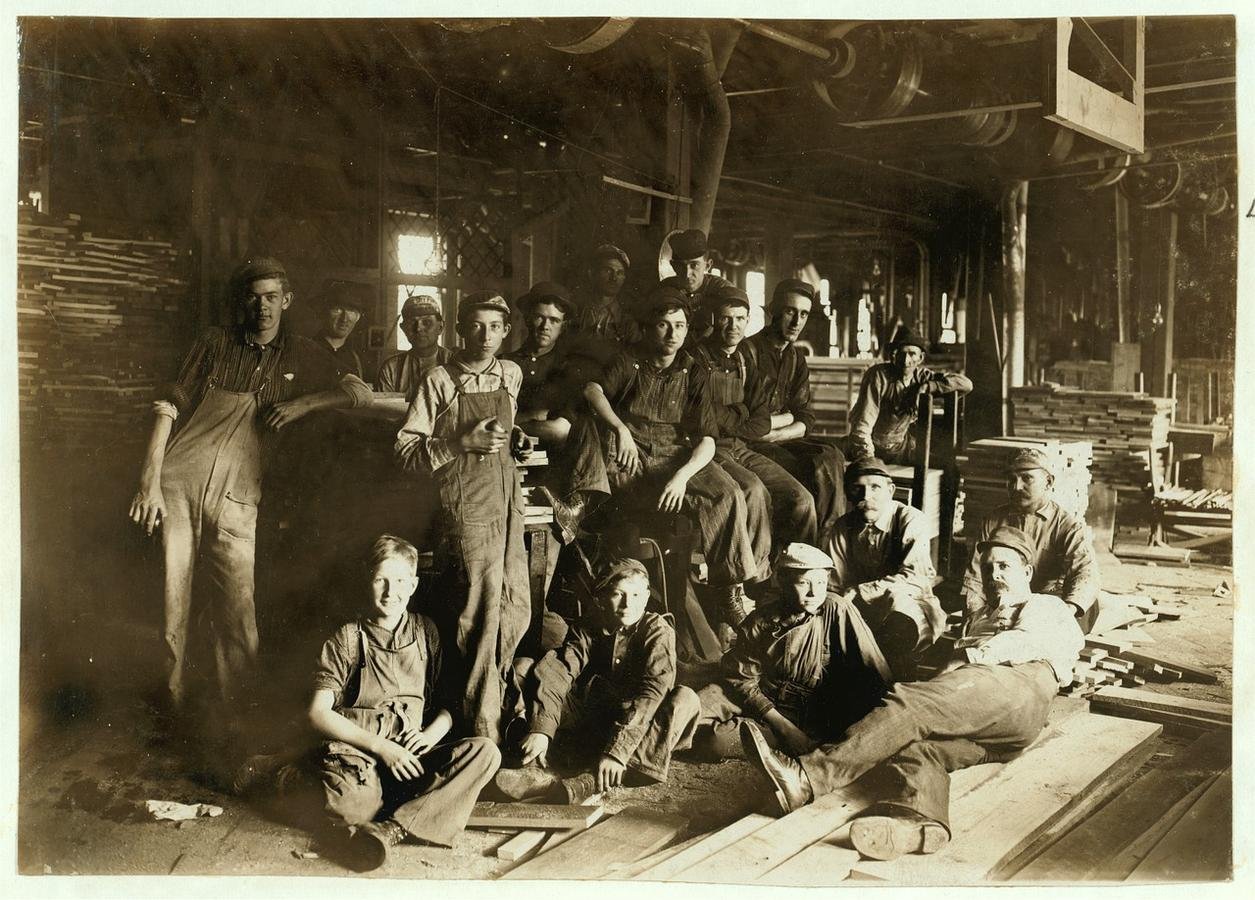
Firms

Conceptualizing the Firm
- (Institutional) Economics
- Firms lower market transaction costs
- Transaction costs defined as...
- Firms lower market transaction costs
the costs of engaging in market transactions other than money -- Bandelj and Sowers (2010)
- Sociologists
- Firms are social groupings defined by
- Goals
- Rules, regulations, restrictions on conduct
- Legal entity
- Firms are social groupings defined by
Firm Size
- States can change affect the size of firms
- Perrow (2002) on firm size
- Strong states -> small firms
- Weak states -> big firms
- System of checks and balances
Firm Organization and Isomorphism
Dimaggio and Powell (1983)
- Why are firms so similar
- Decrease in heterogeneity
- Increase in homogeneity
- Mechanisms
- Normative isomorphism
- Mimetic isomorphism
- Coercive isomorphism
- Example: sex discrimination and maternity leave
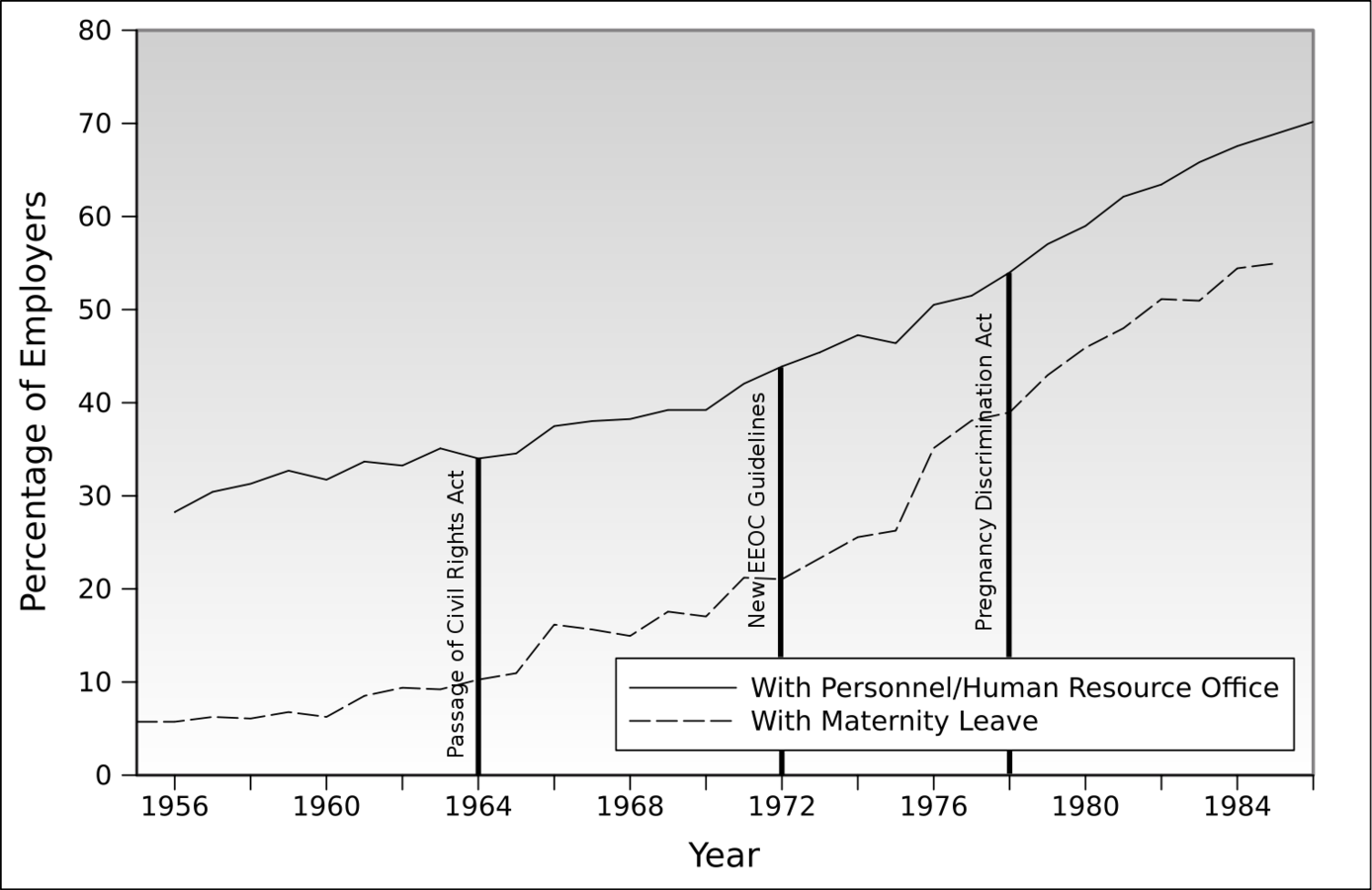
States impose regulations on competition & firm relationships
- Roman Empire and grain supplies
- European Community competition laws & US antitrust
- Antitrust
Legislation regulating competition among firms, involving the prohibition of market dominance, the restriction of cartels, and the limiting of mergers -- Bandelj and Sowers (2010)
- Sherman Antitrust Act (1890)
- Protects consumers against rising costs. Prevents monopolies & "conspiracies" that affect market prices.
- Gave rise to the corporate organizational form
States impose regulations on competition & firm relationships
Variations
- Would be considered cartels in the US
- Chaebol (Korea)
- Grupos economicos (Latin America)
- Keiretsu (Japan)
- State-owned businesses
- Russia
- China
Interlocks
- Many industries and states have laws against interlocks (especially within industry), but enforcement varies
- Elite theory and political implications
The linkages of corporations created by individuals who sit on two or more corporate boards, allowing information sharing and the diffusion of corporate practices. -- Bandelj and Sowers (2010)
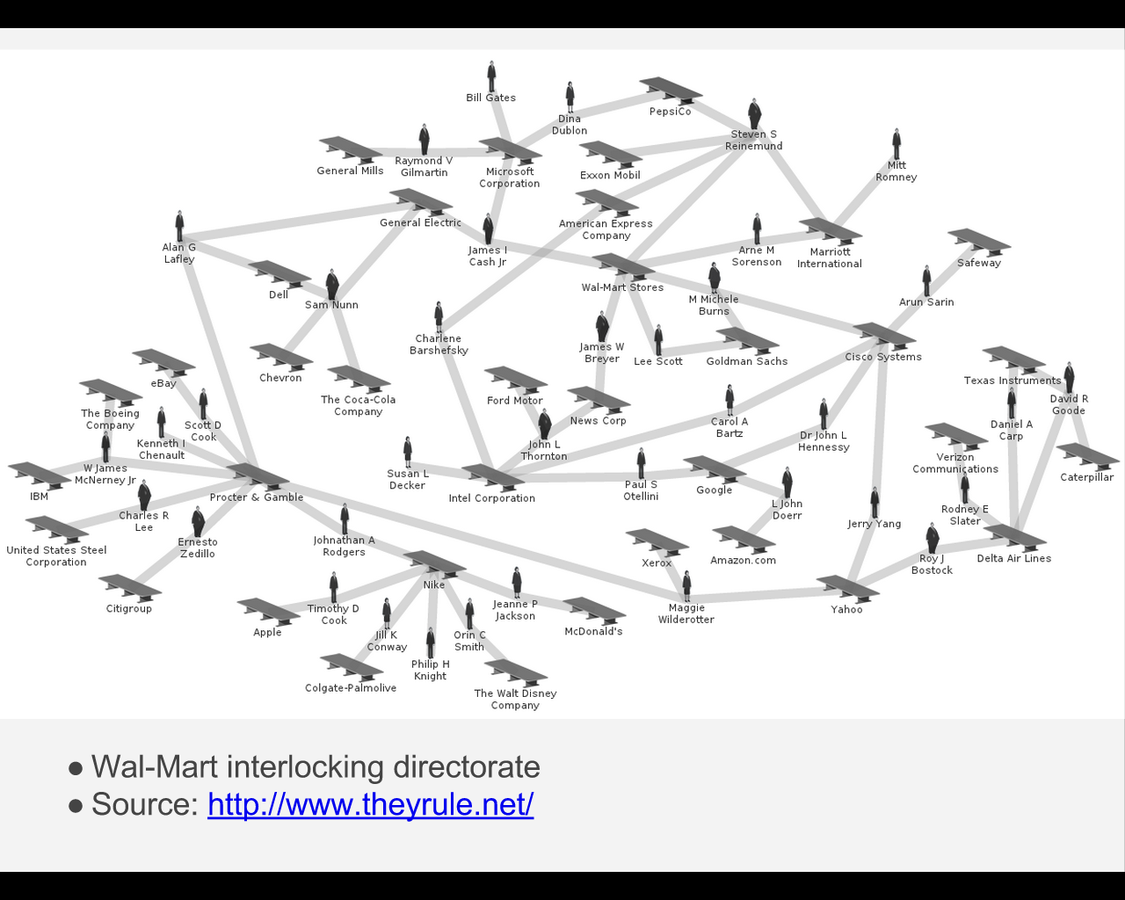
Corporations
- Specific organizational form
- Have the same rights & responsibilities as natural persons (you & me)
- Arose due to historic legislation (Roy 1997)
- Corporations could own other corporations through stock
- Autonomy of directors with respect to shareholders
- Limited liability
- What does this term mean?
- Hire lobbyists to influence policy
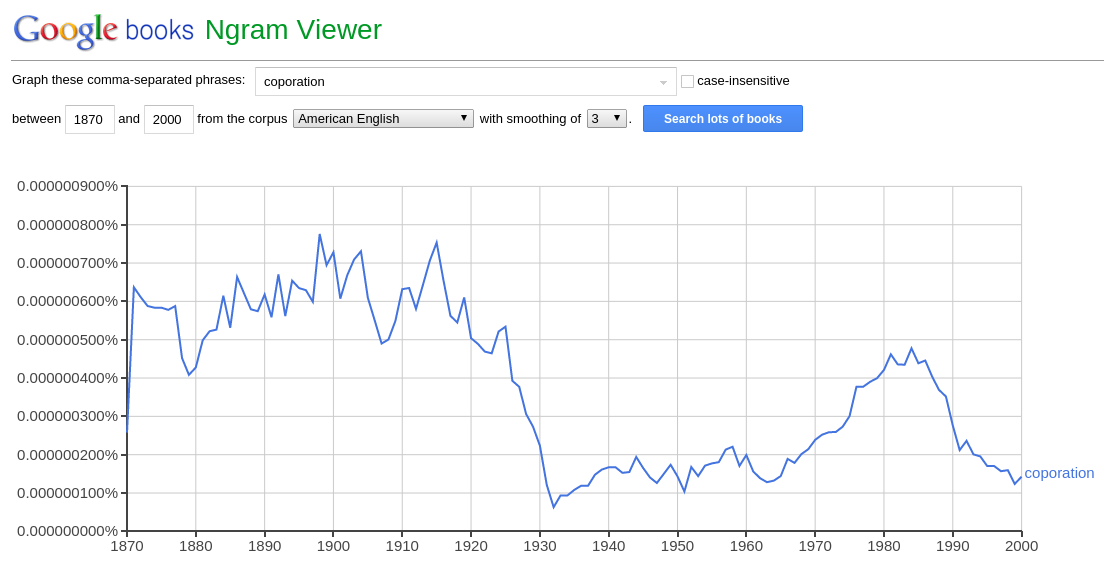
Corporations and Lobbying
source: www.opensecrets.org/lobby/
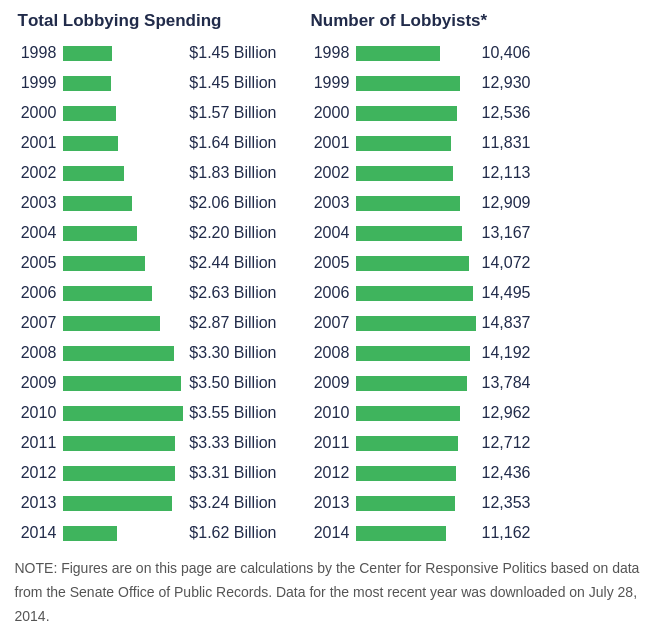
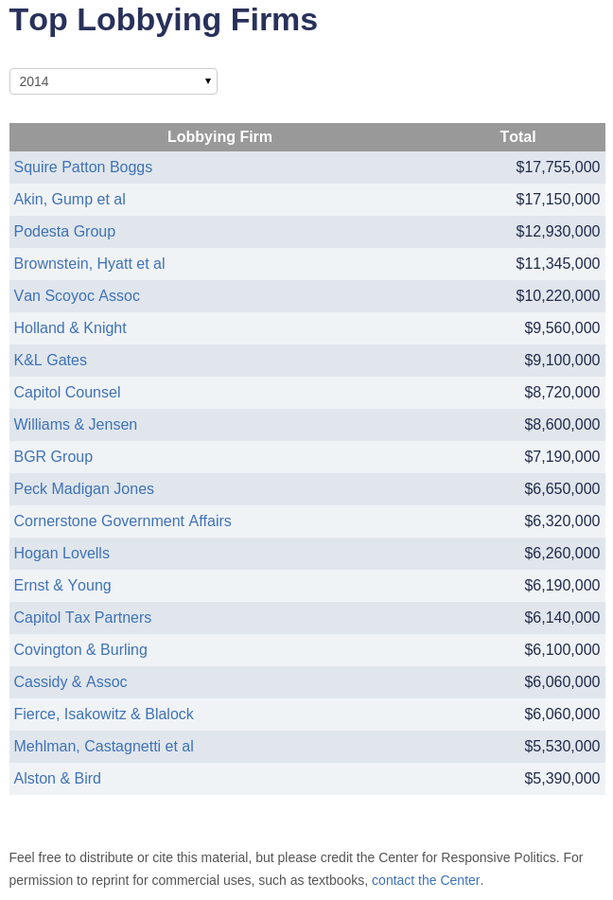
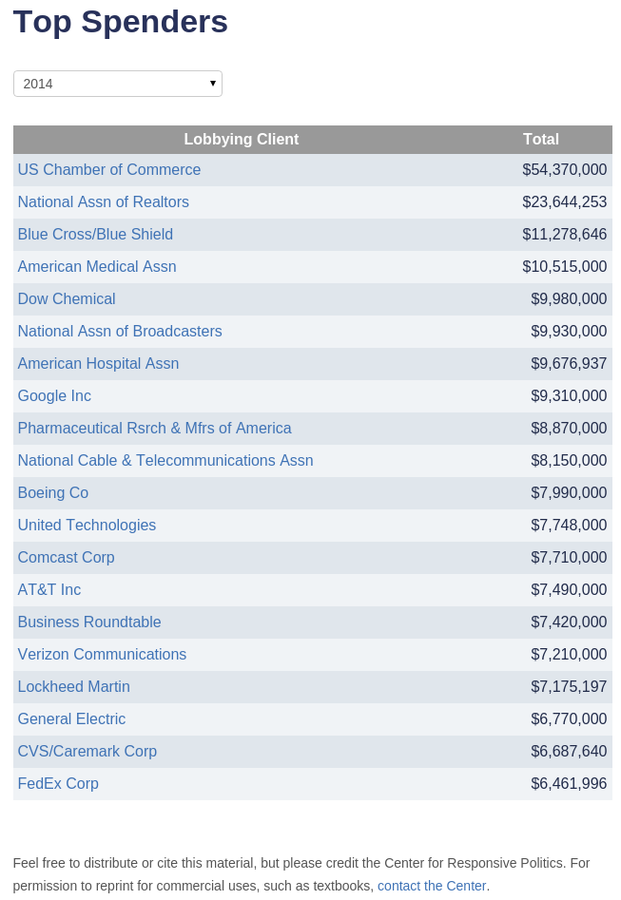
Business Regulations and Consumer Protection
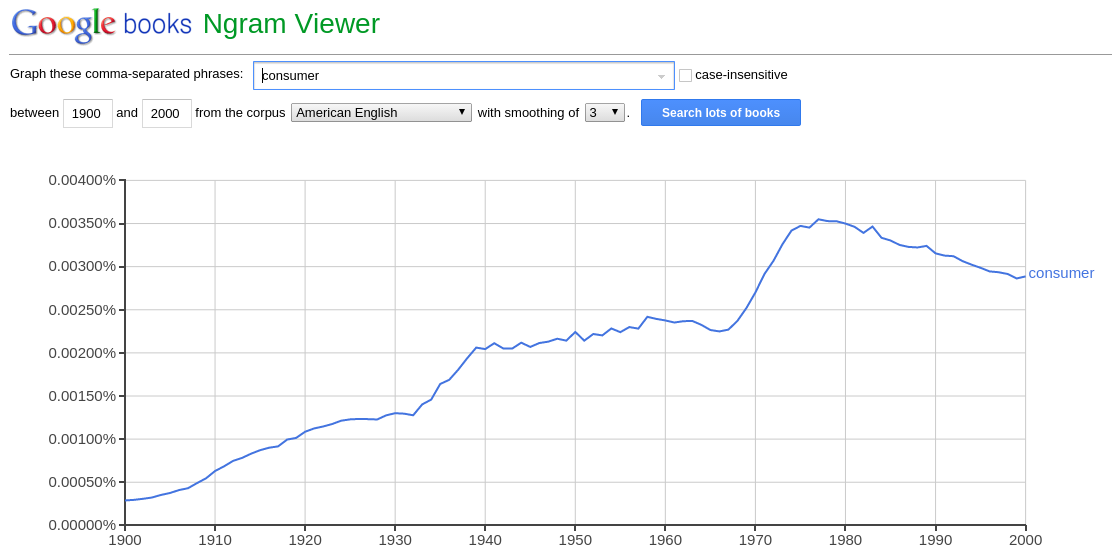
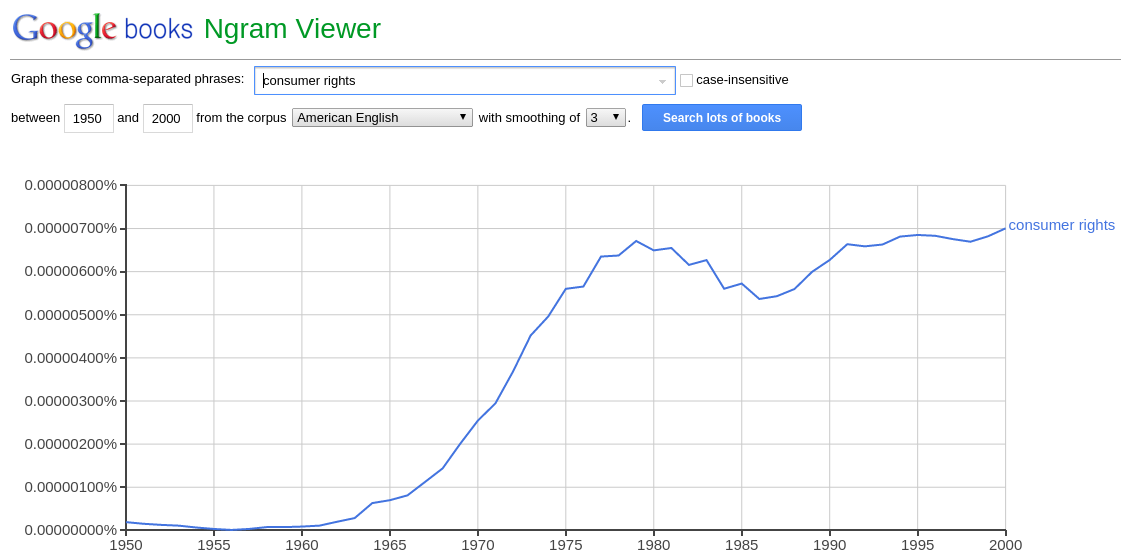
Business Regulations & Consumer Protection
- State intervene on businesses with regard to
- Liability (e.g., negligence, damages, payment of debts)
- Privacy (breaches in disclosing personal information)
- Unfair business practices
- Fraud (deception such that one gains at another's expense)
- Misrepresentation (false statements)
- Unconscionability (consumer cannot know all facts)
- Consumer rights
- States create special departments to ensure consumer safety
- Some examples...

Picture courtesy of M.Minderhoud

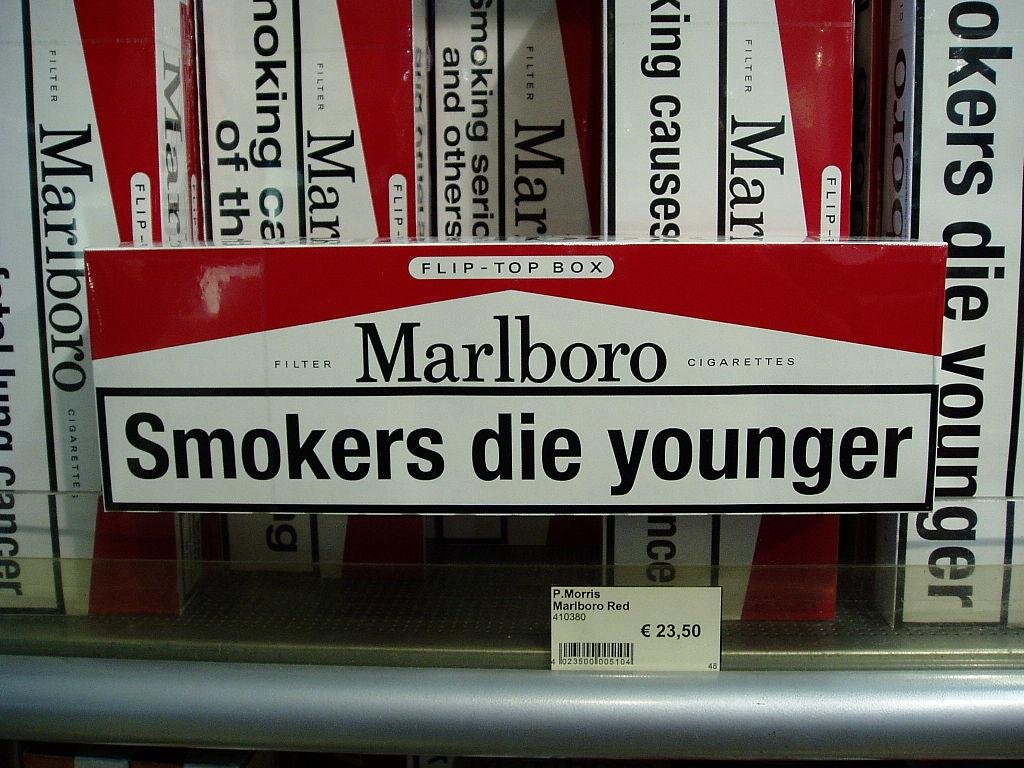
Picture courtesy of Mdd6496
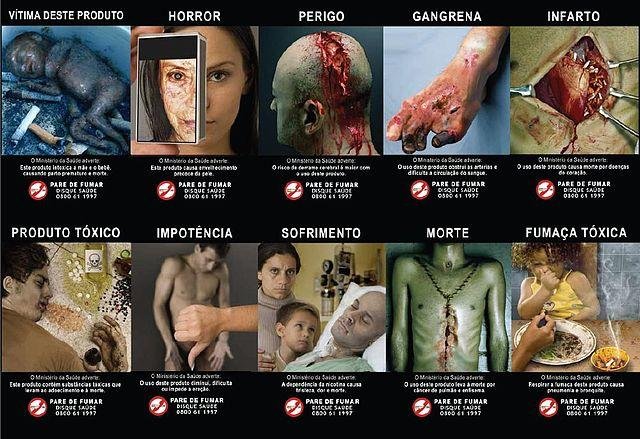
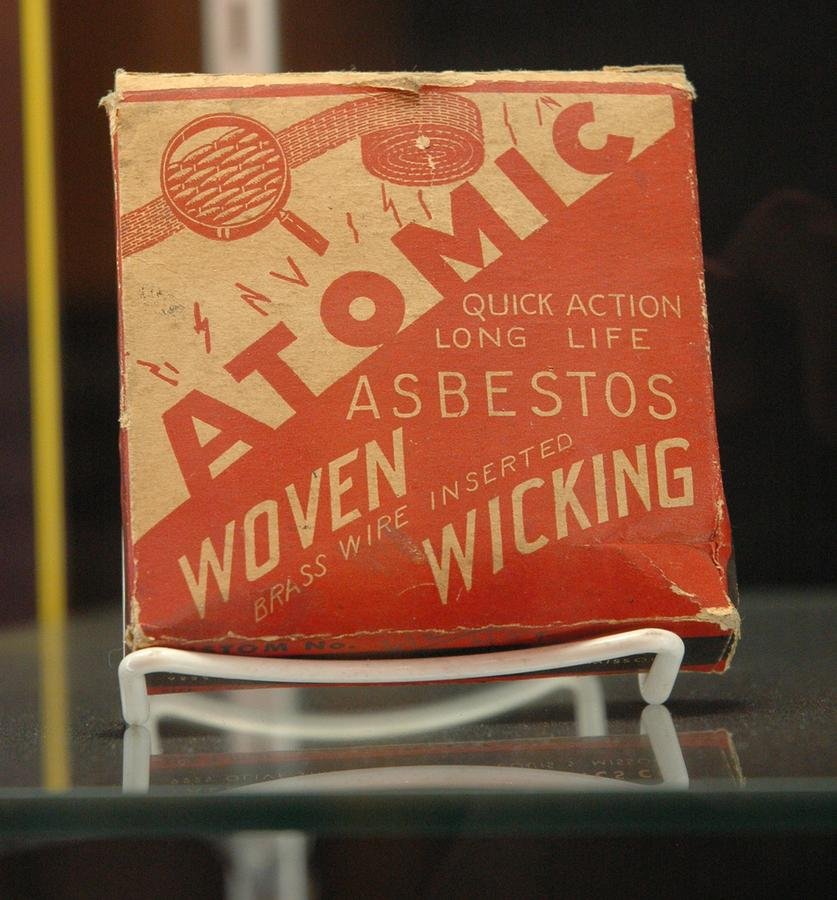
Picture courtesy of Marshall Astor
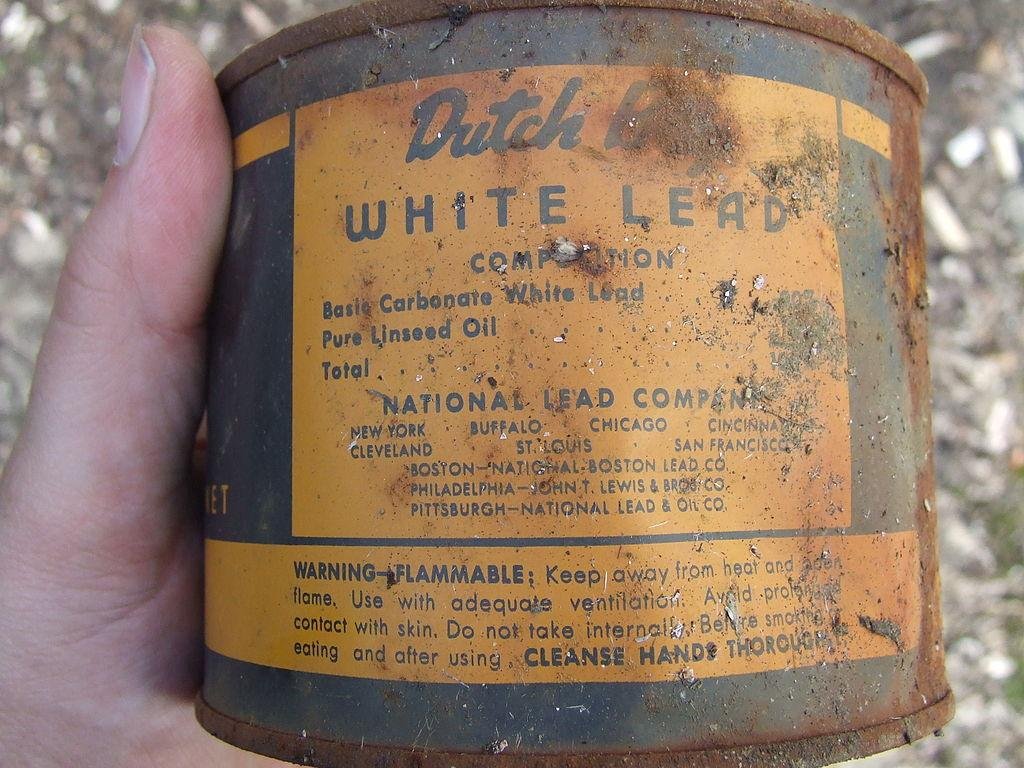
Picture courtesy of Thester11

Wikipedia: Fan Death
Research and Technology
- Governments have an interest in developing research and technology
- Innovations are considered to be crucial in job creation
- Strengthening human capital is part of national development
- Ways states stimulate research and development
- Increase funding and scope of higher education
- Build schools
- Hire more faculty
- Enroll students
- Scientific research in the defense industry
- Grants
- Patents and enforcement of (some) intellectual property rights
- Increase funding and scope of higher education
Research and Technology
Downsides
- Overspecialization and the problem of prediction
- Involvement in of the state in academic research
- Ambiguous connection between technology and production
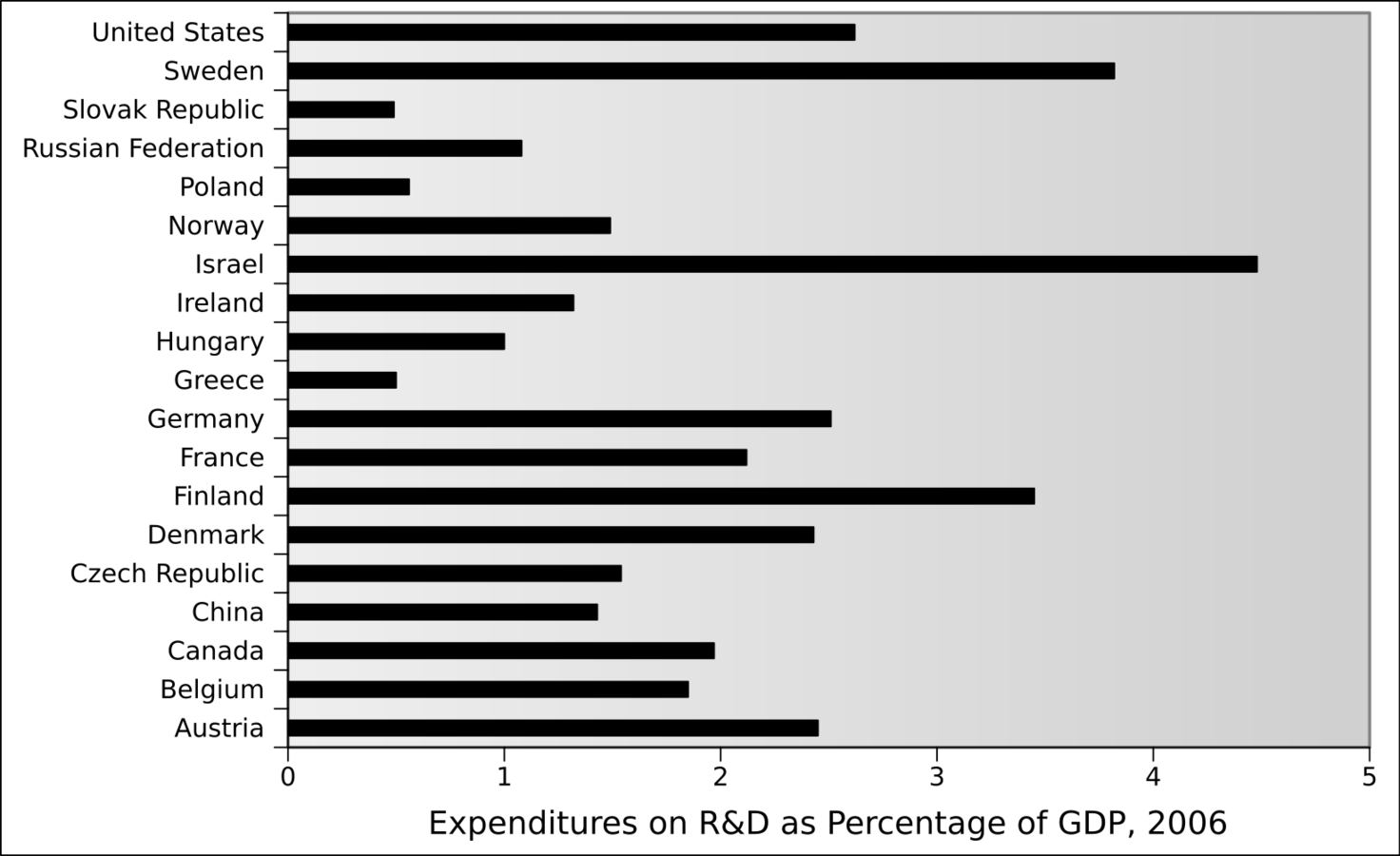
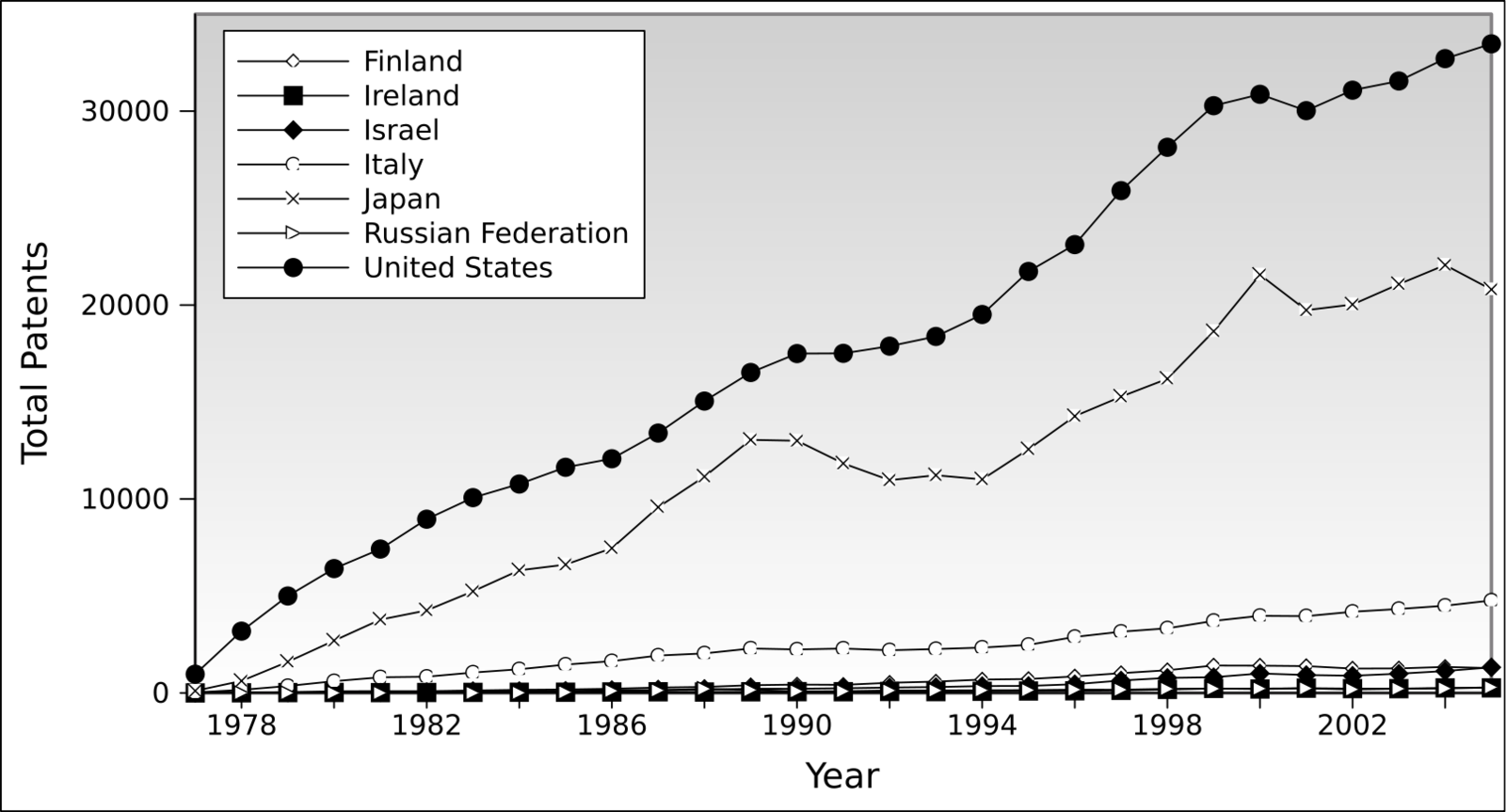
Transactions and Territory
Globalization
The intensification of cross-national flows of goods, services, people, technology, and capital that creates the compression of time and space -- Bandelj and Sowers (2010)
While international trade has intensified, the process isn't new...
Trade routes ~870 CE used by Radhanite Jewish merchants
Image courtesy of Briangotts
Trade Protectionism
Mercantilism
A political economic system that promotes exports while protecting domestic industry through tariffs and other barriers to import. -- Bandelj and Sowers (2010)
- State advocates a positive trade balance
- Typically associated with the 16th through 18th centuries
Who have been advocates for trade protectionism?
David Ricardo?
Adam Smith?
Alexander Hamilton?
U.S. Secretary of the Treasury, 1789 - 1795
- As of 2013, Russia has 331 protectionist measures
- 1/5 of all protectionist measures in the world
- Belarus, second place, has 162 policies.
-
China has approximately 22
Regional and Global Governance Institutions
Image courtesy of Mirandole
Image courtesy of Nicoguaro
Image courtesy of Hayden120 and NuclearVacuum
Image courtesy of Gunawan Kartapranata
ASEAN
Regional and Global Governance Institutions
- Regional: NAFTA, EU, Mercosur, ASEAN, Eurasian Customs Union
- Global: GATT -> WTO. Limited protectionism
- Non-discrimination
- Reciprocity
- Market access
- Fair competition
Alternative trading organizations (ATO)
- Nongovernmental organizations
- Seek to bring goods from developing countries to global markets
- Promote sustainability & reduce poverty
- Part marketing, part message/awareness
- Part of Fair Trade movement
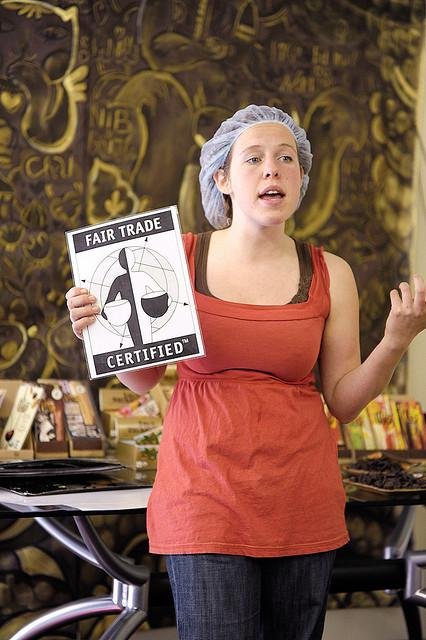
Image courtesy of Brian Dewey
Image courtesy of Colleen Greene
Foreign Direct Investment (FDI)
- A firm in one country establishes or acquires a company in another country -- Multinational Corporations (MNC)
- Consequences
- Uneven development (dependency theory)
- Countries may relax labor standards to attract
- Raises stock prices
- Leads to economic growth and more employment
- Empirically questionable
- "Race to the bottom"
- In order to compete for FDI, states may lower regulations
- Empirically questionable; mixed findings
- Probably lowers taxes
- In order to compete for FDI, states may lower regulations
- State investments attract FDI
Host Country Factors
- "Atomistic"
- Investment predictability
- Typical interests
- Economic strength
- Host state's FDI policy
- Political stability
- Labor control & costs
- No host country agency
Relational Approach
- Economic embeddedness
- Considers agency
- Interests
- Institutional ties
- Political alliances
- Personal and Business networks
- Cultural ties
The State and FDI (Bandelj [2002])
- What determines Foreign Direct Investment?
- Dramatic growth in FDI in 1990s Central and Eastern Europe
- Why did some countries receive more FDI than others?
Neoliberalism
Economic policies advocating a reduced role of the state and unrestrained markets, promoted by international organizations and domestic political interests such as the Reagan and Thatcher governments. -- Bandelj and Sowers (2010)
Neoliberalism
- Economic & political philosophy that
likes♥LOVES♥ free markets - Origins in 1970s & 1980s
- Likely due to oil shocks resulting from OPEC's decisions
- Began in US and UK. Keynesian policies cut. Then diffused.
- Washington Consensus
- US approaches multilateral agreements like an investor. Mentions its desirable reforms (i.e., neoliberalism). If refused, US delegates cease negotiations
- Typical recommendations
- Cut social services, fewer regulations
- More imports, less Import-Substitution Industrialization
- Mixed success (sometimes failure)
Neoliberalism
- Resistance
- Labor unions
- Leftist political regimes
- Recall welfare state & decommodification discussions
- Commitment
- Neoliberalism can never be fully implemented
- Politicians have an incentive to adopt the policy
- Diffuses responsibility of a poor economy
- Reduces political liability
- Limited evidence in favor of neoliberalism, maybe unwise
Salience of Nation-States in the Global Era
Image courtesy of Bobby P.

- Employs ~2.1 million people
- Revenue: $421.849 billion
- Population: ~5.4 million people
- GDP: $185.979 billion
Image courtesy of Shmuel Spiegelman
Image courtesy of kakidai
Image courtesy of timsdad
Image courtesy of Gérard Ducher
SALIENCE OF NATION-STATES IN THE GLOBAL ERA
- Challenges to dominance
- Role of the State vis-à-vis multinational corporations
- Role of nation-states vis-à-vis cities (Sassen's "global cities")
- Neoliberalism
- Markets can & do make demands on states (Fligstein 1996)
- BUT, let's be reasonable
- States have been quite strong since World War II
- States do regulate the economy
- States have the final say on policies
- The same powerful countries before the rise in globalization remain powerful
The State and Environment
Image courtesy of Жучкова Екатерина
Image courtesy of Erik Christensen
International Whaling Commission
Image courtesy of Lokal_Profil
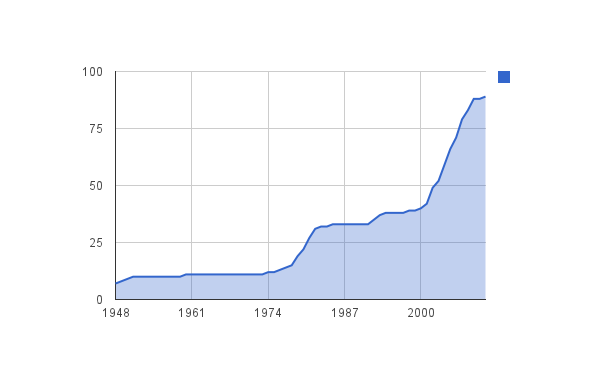
International Whaling Commission
Number of member states over time
Source: IWC
Image courtesy of Pelle
Valley of the Drums
Environment and FICTITIOUS Commodities
- The concept of "the environment" is rather large and vague.
- Which features of the world traditionally get included when discussing the environment?
- Which of these features are commodified?
- Which of these features are fictitious commodities?
- Why?
- As economic sociologists...
- Why should care about the environment?
- Are we actually capable of addressing it?
Macrostructural Theories on the State and the Environment
- Treadmill of Production
- Since 1950s, production has increased
- Production ⇧, Demand for Resource Extraction ⇧
- Production ⇧, Byproduct waste ⇧
- Technology ⇧, (Production ⇧ & Labor Power ⇩)
- Ecological Modernization
- Normative and cultural pressures
- Technology is improving such that environmental degradation is no longer a cheaper
- Clean practices can be efficient
- Environmentally friendly practices are good business
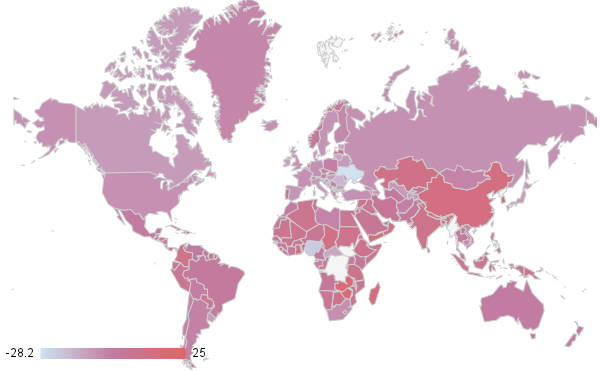
Percent Change in CO2 Emissions, 2008-2009
Source: Energy Information Admin
Paradox of Ecological Exploitation
- Relationship between firms growth and political capacity
- Firms vs. local communities
- "Not In My Backyard" (NIMBY)
- Class inequalities
- Suburban situations
- React before a firm locates
- Can be effective
- Do not work at hazardous worksite
- Urban situations
- React after a firm locates
- More hazard-prone
- Often work at hazardous worksite
- Technical and political obstacles
- Limited help from national organizations
- Suburban situations
Environment & the State
THREE PERSPECTIVES
- Economic Model
- Managed Scarcity
- Ecological Model
Economic Model
- Profit
- Decisions lie upon the firms and property owners
- The role of private property
- Concepts to consider
- What are the dimensions of property rights?
- How does the state legislate the environment vis-a-vis property rights?
Economic model: A Caricature
"Industrial Hellscape" by Vermin Inc
Managed Scarcity
- Economic production and environmental degradation have an inherent relationship
- Does the state value economic profit or social goals?
- States restrict the economy accordingly
- Jobs that can and cannot be performed
- Chemicals and materials that can and cannot be used
- The conditions and locations of economic activities
- State agencies act as regulators
- Contestation
- Scientific
- Legal
- Contestation
- Example: Cap-and-trade
Managed Scarcity At Work
Ecological
- Protect ecosystem and biodiversity
- Normative
- Deep ecology
- Humankind is only one species of millions
- Domination of an ecosystem is an illegitimate enterprise
- Includes
- Sustainability perspectives
- Newly branded "ecoterrorists"
Ecological Models: A Caricature
Case Study: Recycling
- European model
- Encourage returnable, reusable containers
- Make manufacturers responsible for solid waste
- U.S. model
- Profit-driven
- Indirect state subsidies
- Recycling has become an industry
- Russian model
- ?
♻
